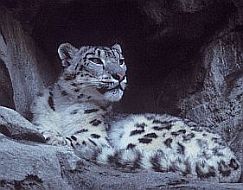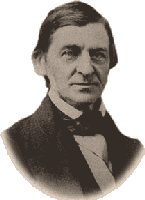| BLACKBOARD I | ||||||||||||||||
*****************************
To see a World in a Gram of Pot,
From: "Ditties of Depravity" *****************************
"We feel free when we escape -- even if it be but from the frying pan to the fire."
The sixth century BC Ionian philosopher, Anaximander, believed that all life began in the seas, came onto land and evolved into the many forms we see around us. Imagine that --- sixth century BC! He is regarded by some as the father of evolutionary theory.
***************************** Stephen J. Gould in Wonderful Life:"I am not speaking of randomness, but of the central principle of all history—contingency. A historical explanation does not rest on direct deductions from laws of nature, but on an unpredictable sequence of antecedent states, where any major change in any step of the sequence would have altered the final result. This final result is therefore dependent, or contingent, upon everything that came before—the unerasable and determining signature of history."
From Text book on Quantum Mechanics: "Once quantization is established, it becomes inevitable to regard a physical process as the progression of a series of individual, discontinuous, elementary processes (quantum jumps), each of which cannot be analyzed further. This then leads to the conclusion that a completely specified initial condition does not necessarily lead to a definite result at a later time."
Gould again: "I call this experiment replaying life’s tape. You press the rewind button and, making sure you thoroughly erase everything that actually happened, go back to any time and place in the past . . . . Then let the tape run again and see if the repetition looks at all like the original."
He did not believe it would and anything resembling humans as one of many possible outcomes was unlikely. Fine-tuning refers to the surprising precision of nature’s physical laws and universal constants and the beginning state of the universe, its initial conditions. If any property or parameter -- masses of particles, strength of forces, overall amount of matter -- were altered even slightly, life and humans would not have evolved because the universe would be quite different. The Anthropic Principle is based on this observation. The determinism implied by this principle and expressed by its emphasis on the sufficiency of the integrity of the initial conditions to bring about a life-giving universe is called into question. That is, reliance on fine-tuning of initial conditions is not enough, contingency must play a decisive role not only with life's history but also with the quantum trajectory of the universe as a whole. A particular quantum path or trajectory is a contingency, and all possible contenders in a superposition of contingent events are on the table, from moment to moment. In the real world, however, there is no such thing as randomness; preferred directions stand out, like footpaths in the wilderness. Nature leads the way.
Contingency interacts with necessity. Contingency: dependence on chance or on the fulfillment of a condition; something whose occurrence depends on chance or uncertain conditions. Necessity: the power of natural law that cannot be other than it is; natural causation; anything that is inevitable, unavoidable, etc. as a result of natural law.
********************** "The details lay in a realm of contingency, undirected by laws that set the channels. Laws in the background, contingency in the details."
"I feel sure of only one conclusion. The ability to design and create new forms of life marks a turning-point in the history of our species and our planet."
**********************  Movies:
Movies:In the King Kong movies, they have a huge 50- or 60-foot massively-built wall separating Kong from the villagers. My question is: Why the hell does it have a King Kong-size gate smack in the middle of it? Huh? Do the villagers sometimes invite Kong over for barbecues or celebrations from time to time? What's with that gate? In the Sci-Fi movie Independence Day, which I musta seen half a dozen times, the character Will Smith plays takes a helicopter to go find his girfriend and, in the midst of total carnage and destruction, lands right where she is. Did I miss something? Six times? How the hell...? Why are there dinosaurs and green growing things and especially light in the center of the Earth? Huh? In the Terminator movies the Terminator is able to mimic any voice, yet, for his natural voice he chooses to speak with an Austrian accent.
*****************************
Some people are born with too much conscience,
***************************** 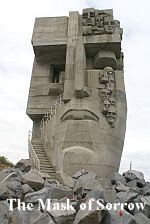
From The Art of the Novel by Milan Kundera (author of The Unbearable Lightness of Being), page 110; published 1988, just before the collapse of the Soviet Union: "Totalitarian society, especially in its more extreme versions, tends to abolish the boundary between the public and private; power, as it grows ever more opaque, requires the lives of citizens to be entirely transparent. The ideal of life without secrets corresponds to the ideal of the exemplary family: a citizen does not have the right to hide anything at all from the Party or the State, just as a child has no right to keep a secret from his father or his mother. In their propaganda, totalitarian societies project an idyllic smile: they want to be seen as "one big family"."
*********************** "They who can give up essential liberty to obtain a little temporary safety deserve neither liberty nor safety."
"He accepts the world as is, he will never die."
*********************** In my early twenties I dropped out. I was attending Graduate school and, for no better reason than I was tired of going to school, I decided to quit for a brief period of time, I thought. Now, here I am at the age of 60, without a whole lot to do and not caring all that much, it being too late for a lot of things. I've decided to once again drop out, for the long haul, however long it may be. It doesn't feel the same, I have to admit, but, what the hell.
Every so often silly stuff pops into my head. I mean, other than the usual silly stuff. For instance:
Love spelled backwards is the beginning of evolution. So what?
How about: Love locked in a reciprocating loop is the beginning of evolution. A mad-man spoke in dialectic tones, spouting to the trees, the birds, the insects. Out loud he called the name of his love, over and over, as though expecting a response. Gone now these two years, one month and fourteen days, dead by nature's hand. His heart was broken, dead and dying. He cursed God now. He used to pray to him every day, sincerely asking to keep his sweetheart safe. But no more, no more; he no longer believed in such childish things and had become quite insane, anguish his now secret and constant companion, a knife through his heart he would not pull out. He toyed with thoughts of death, how easy it would be to kill himself, to unfreeze at the last moment. Often of late he found himself wondering why people fought so hard to live, to continue breathing, knowing, feeling. But he held back, somehow, for some reason he knew not. Time was all he had and it dragged on, dragging his unwilling body along for the ride.
That's the picture from the point of view of mathematical quanta. At the opposite extreme we have: all possible identities happening simultaneously -- Feynman's electron traveling all trajectories at once. Gradients of spacetime are the orthogonal projections of these planar elements, and, by extension, of the entire surface which they compose. The individual curves represent the eigenstates and the surface itself, the wavefunction. The ego-filter identifies with the classical realm, that surface-interface separating us from our selves. When the ego-filter is suspended, or passed through as though not existing -- rendered transparent -- the Mind/Body can then identify with its surroundings through orthogonal projections of the self as channels of knowing -- Doors of Perception as Huxley put it. What I'm trying to say is: It's possible to get out from under our own thumbs. However,..., there's always a caveat with such things. This ego-filter also acts to protect us from knowing unflattering and deflating things about ourselves we'd rather suppress or ignore. So, with an iron grip we hold on to the illusion-image. We all know people who seem to revel in being self-oblivious. Self-centered, shallow, ignorant, obnoxious people who never apologize for any mis-behaviour because they never see anything they do as wrong. I know a few. I know one guy, in fact, that if someone were lying beside him on the ground bleeding to death, he'd still sit there and go on talking about himself as though everything was peachy-keen -- oblivious. So that's the danger in dropping the ego-facade -- self-exposure, seeing how we truly are. Takes balls. Confrontation without rationalization, without justifying our actions based on what we perceive as the right course, the right course being a disguise for self-interest, usually petty. Pain is the catalyst. Self-inflicted pain, emotional anguish for which we can find no one but ourselves to blame. We might find out something about our selves for which there is no cure, some personality trait or incapacity -- arrested empathy -- for which we can do little. But, I believe everybody's dysfunctional in one way or another and to a greater or lesser extent. Painful episodes are opportunities to learn, disillusionment could lead to a sober acceptance but without the ususal pat on the back. Not being who we are at ground level is what gets us into these messes in the first place. And that's why we get angry with ourselves. If only..... We have to make do with what we got; that's all there is to it. Have a nice day. My father left us before I was born. My mother once famously said to me that I almost didn't happen. I never heard from him, ever, not on any of my birthdays or at Christmas or any other time. He died when I was 30; we found out through some mysterious contact from his side of the family -- none of whom I ever met. Over the years when I was attempting to fathom life in general, the human condition -- a common pursuit in the 60's and 70's -- and the whys and wherefores of my behaviour, I'd peel away a layer here, a layer there. I was feverishly searching for answers. But in spite of some random succcesses, usually triggered by an emotional crisis or traumatic event, I remained unsatisfied, not having peeled away enough, not down to the base of the problem. But after this last,..., event, I've scraped bottom. My dad's never coming home. He left, and it's my fault. True or not, the sense of not being cared about by someone majorly important in one's life takes up residence in the bones and forever will remain. See it, own it, eat it. And move on. Strangely, or perhaps not so strangely, what I've discovered is that whenever I've been guilty of abandoning someone I actually, genuinely cared about, the self-inflicted pain is deadly, literally. Maybe it's hereditary. I don't know. Or maybe it's a rule: When we commit towards others the most emotionally devastating thing that's ever happened to us, the shearing pain is magnified proportionately. Because of that, you'd think we'd take extra special care not to commit such clearly self-destructive acts. But, we don't. Why? [two months later] My mind works like this: when I was a serious math student in my university days, I would oftentimes wake up in the night with the solution to a problem that had been intractable. My mind works on things independently, and not only math problems. So, I've finally seen the source of this problem with abandonment. We grow up in our respective social and family environments absorbing everybody else's private psychological world by osmosis and through actual contact, impinging and overlapping the mental states of others. Within that morass is our own very personal psychological make-up, our own perspective, if you will. Without conscious volition, we seek to realize it. But, somethings stay unnoticed, hiding in the background and manipulating us towards some place in our minds we'd grown accustomed to. A sense of abandonment can be such a place. For me, I believe that's true. In the act of abandoning my most precious and life affirming relationship, I also abandon myself, returning to that familiar state of mind, painful as it is. I think that's what I do.
*********************** HomecomingFrank was sitting on a moss-covered log in the quiet, peaceful forest. It was his desire to sit some place with little to no distractions in order to think. Pleased at his choice, random as it was, he tried to focus his mind. But to no avail; it was a scrambled mess, a storm of confused energy racing in tendrils, each one chasing another's tail. After a brief attempt at control, he relented and instead simply opened his senses. It was busier than he'd first surmised. Squirrels, all kinds of birds, the grating call of a large crow passing overhead; insects, fliers and walkers; and spiders, everywhere, busy building or repairing webs that glistened intermittently in the mottled sunlight. And just the slightest of breezes swayed the branches; the brushing caress moving his soul strangely, unexpectedly.
Having managed to completely forget himself, his mind magically cleared. He wanted to think about relationships, all manner of relationships, not just human; relationship itself, in other words. It had to do with society, he thought, with communities of people relating to one another. But then, no, he shook his head. That's not it. Something more personal, something to do with love and caring and friendship. Trust, respect, consideration, sacrifice. He sought to understand it, to feel the problem with his heart and soul. He had had such terrible luck with friendships. He offered it to others only
Now, resting on the moss-covered log in the middle of the quiet woods, he realized what he must do, realized with a certainty he seldom knew in his unstable emotional world. Screw people, he said out loud. Not with anger or meanness or sadness even, as though a great loss had befallen him. No, he just said it, dryly and without enthusiasm. He raised the handgun to the side of his head, and while concentrating on the pure beauty of the distant cry of an owl hooting, closed his eyes and pulled the trigger. But instead of an explosion in his brain and then darkness, he heard the faintest of yelps. He opened his eyes and stared dumbfounded at the gun. There, stuck between the hammer and the bullet was the thumb of a tiny winged creature, her mouth wide, blinking frantically, tears brimming. Momentarily paralyzed with shock and disbelief, he sat staring and listening to her shrill cries. Finally, he shook himself out of it and pulled the hammer back, releasing her. In haste, she flew off a bit to a safe distance.
*********************** Notable Women of Science 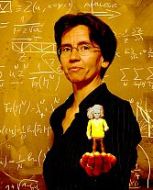
Renate Loll's Home Page Co-inventer of the theory of Quantum Gravity known as
The Office of Janna Levin
A Madman Dreams Of Turing Machines A Madman Dreams Of Turing Machines | PDF File ----- A New York Times Review
Harvard Physics Department Faculty: Lisa Randall Author of Warped Passages:
Amy Mainzer is an astrophysicist and astronomer specializing in astrophysical instrumentation and galactic astronomy. Her research interests include: asteroids, brown dwarfs, planetary atmospheres, debris disks, star formation as well as design and construction of novel instrumentation for ground and space. She is the Deputy Project Scientist for NASA's Wide-field Infrared Survey Explorer, or WISE [launched in December, 2009], busy surveying the landscape of the infrared sky, building up a catalog of cosmic specimens -- everything from distant galaxies to "failed" stars, called brown dwarfs. She is also the principal investigator of NEOWISE, a program to catalog asteroids seen with WISE. To date -- July 12, 2010, WISE has taken a million infrared pictures.
In collaboration with Richard J. O'Connell they submitted the article Convection scaling and subduction on Earth and super-Earths to the journal: Earth and Planetary Science Letters.
UNIVERSITY COLLEGE DUBLIN (UCD) is a leading European research-intensive university where third-level undergraduate education, fourth-level postgraduate masters and PhD training, research, innovation and community engagement form a continuum of activity.
Watch NOVA video profile of Vandi Verma. Aired January 19, 2011.
"If we could change our psychic apparatus and should then discover that the world around us was changing, this would constitute for us the proof of the dependence of the properties of space upon the properties of consciousness." "Why seek the miraculous and supernatural beyond life?" From Tertium Organum by P. D. Ouspensky
"The thoughts that one creates generate patterns at the mind level of nature." William Tiller ---- Tiller Foundation
*********************** A Third WayI've had this idea rumbling around in my head for some time. It's not earthshaking and, in fact, is probably obvious.
Our minds operate in a dualistic fashion: something is either this or that. What if there is a level in between -- a bridge -- that we are simply not able or capable of seeing? Something from which the two contenders might be derived. Now, the quantum picture is a generalization of the classical when taken to its logical extremes. Is this a clue? Will we discover that the Grand Unifying Theorem and principle of the universe is something other than the result of a shotgun wedding between Relativity and Quantum Mechanics? Trying to force gravity to behave quantumly, or to somehow force the quantum world to behave in a relativistic fashion might be a colossal waste of time and energy. What we know about the physical universe depends completely on the questions asked of it. Are the right questions being asked? From the scientific perspective, we entertain two, and only two, levels of reality. Could some civilization on another planet be aware of multiple layers, several realms of reality, which collectively form one great package -- the whole shebang? And if so, have they discovered the Mother explanation from which all the others can be considered as special cases, offshoots separately accountable for all they see before them? We humans are at the threshold of scientific investigation into the workings of the universe. As we learn more our awareness and our brains grow in scope and realization. But we are handicapped by duality of thought and by a resistance to consider ideas that may, on the surface at least, appear non-scientific. When I think about the nature of things, of reality, I borrow ideas from diverse areas and fields of inquiry, parallel structures, including ones that have no legitimate claim to domains outside their home of origin. For instance, I compare probability distributions with attractors with the notion of nonlinearity, and homotopic maps with superpositions of quantum trajectories with families of curves forming a surface. What does the idea of a surface [f(x,y,z)=c] share with a monochromatic wave equaling a single energy frequency? Is a surface and an eigenstate of energy somehow the same?
There may very well be a third way, an intermediate reality, from which point-of-view both relativity and the quantum world can be derived and made clearer, without the strain. It may take a cross-fertilization of ideas from ALL fields of endeavor. Or, it may simply be beyond our present reach, we Cro-Magnons. ***********************  The Hopi universe is a perpetual growing away in time-space from a central axis. The subjective realm is the inner, vertical, vibratory axis, the heart of all events before they happen. There are several worlds nested one above the other, and the way to travel from one to the next lies within.
The Hopi universe is a perpetual growing away in time-space from a central axis. The subjective realm is the inner, vertical, vibratory axis, the heart of all events before they happen. There are several worlds nested one above the other, and the way to travel from one to the next lies within."...man rises upward, bringing into predominant function each of the higher centers. The door at the crown of the head then opens, and he merges into the wholeness of all Creation, whence he sprang. It is a Road of Life he has traveled by his own free will, exhausting every capacity for good or evil, that he may know himself at last as a finite part of infinity." From the Book of the Hopi by Frank Waters
"The interpretation the Shin people give to the "Namu-amida-butsu" is more than literal though not at all mystical or esoteric. It is in fact philosophical. When Amida is regarded as the object of adoration, he is separated from the devotee standing all by himself. But when Namu is added to the Name the whole thing acquires a new meaning because it now symbolizes the unification of Amida and the devotee, wherein the duality no longer exists. This however does not indicate that the devotee is lost or absorbed in Amida so that his individuality is no longer tenable as such. The unity is there as "Namu" plus "Amidabutsu," but the Namu (ki) has not vanished. It is there as if it were not there. This ambivalence is the mystery of the Nembutsu. In Shin terms it is the oneness of the ki and the ho, and the mystery is called the incomprehensibility of Buddha-wisdom (Buddhajna). The Shin teachings revolve around this axis of incomprehensibility (fushigi in Japanese, acintya in Sanskrit)."
From Mysticism, Christian and Buddhist
Nor stand of a mirror bright. Since all is void, Where can the dust alight?" "The self is realized in the act of action."
If you're into chemistry, or just appreciate very well done and extremely informative web sites, check out The Photographic Periodic Table of the Elements and Dynamic Periodic Table. You can learn stuff. For example, I learned from the second one that: "Most molybdenum compounds have low solubility in water, but the molybdate ion MoO42- is soluble and will form if molybdenum-containing minerals are in contact with oxygen and water. Recent theories suggest that the release of oxygen by early life was important in removing molybdenum from minerals into a soluble form in the early oceans, where it was used as a catalyst by single-celled organisms. This sequence may have been important in the history of life, because molybdenum-containing enzymes then became the most important catalysts used by some bacteria to break the chemical bond in atmospheric molecular nitrogen, allowing biological nitrogen fixation. This, in turn allowed biologically driven nitrogen-fertilization of the oceans, and thus the development of more complex organisms." There seems to be no end to the number of contingencies that contrived to produce multicellular life.
Oh, by the way, element 117, Ununseptium, was recently discovered -- April, 2010. They talk about such things as "islands of stability." Another point of interest from the same news source -- Internet Chemistry News -- is Ligand Field Theory and the Emergence of Life. Recent experiments with insightful conclusions and conjecture. For instance, one quote: "... the basic molecular ingredients of metabolism accumulated and were able to self-organize into networks of chemical reactions that laid the foundation for life." Self-organize into networks. So, what came first, the constituents or the network? The chicken or the egg?
If you're interested in evolutionary development and genetics -- the history of Life -- another concept worth looking at -- first seen in Franklin Harold's The Way of the Cell and at other times in Scientific American articles -- is Epigenetics. Researchers are probing ways to use this recently developed idea as a possible method for solving serious degenerative diseases including cancer, heart disease, stroke and neurological disorders. Basically, it goes like this: "The new field of "epigenetics" is rapidly revealing how people, plants and animals do start with a certain genetic code at conception. But, the choice of which genes are "expressed," or activated, is strongly affected by environmental influences." Nature/Nurture, Nature/Nurture, Nature/Nurture,.....
******************* Slow Down Strange days now. Soft and warm and stretched out. Quiet and smooth with no need of me. Bamboo-hollow sounding if they had a sound. Thin white bark peeling with tiny holes in it like dead skin sunburned and dried. Small things attract my
attention, draw me like a screen door slamming on a hot summer day when a kid after ice tea, my bare feet scruffing the rough porch. Tiny pieces of feelings flake off into the breeze, lost forever with memories like shadows blinded by
the sun. The man next door had a Packard with running boards. We used to hold onto the door handles and stealthfully, we imagined, step on the boards when he pulled away and ride up to the corner before he'd yell to get off. I think now he always knew we were there from the start. I don't remember his name.
Strange days now. Soft and warm and stretched out. Quiet and smooth with no need of me. Bamboo-hollow sounding if they had a sound. Thin white bark peeling with tiny holes in it like dead skin sunburned and dried. Small things attract my
attention, draw me like a screen door slamming on a hot summer day when a kid after ice tea, my bare feet scruffing the rough porch. Tiny pieces of feelings flake off into the breeze, lost forever with memories like shadows blinded by
the sun. The man next door had a Packard with running boards. We used to hold onto the door handles and stealthfully, we imagined, step on the boards when he pulled away and ride up to the corner before he'd yell to get off. I think now he always knew we were there from the start. I don't remember his name.
*********************** 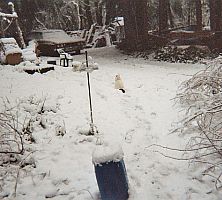 It's raining out. September in the Northwest. The rain is a blanket I pull over myself. But, I seem to remember saying that about bourbon too, so, .....
It's raining out. September in the Northwest. The rain is a blanket I pull over myself. But, I seem to remember saying that about bourbon too, so, .....Rain sucks. Usually it barely trickles down; you know, rain so fine you can hardly see it; not even worthy of the name drizzle. But, on the other hand (there's always another hand), what I actually do like about rain, for instance, is huddling inside in the middle of the afternoon, the blinds closed, heat on, drinking a bottle of wine while watching a Death Wish movie marathon. What a life! Rain pitter-pattering on the roof, good Aussie red wine with cheddar cheese, and movies with lots of worthless low-lifes getting killed. The Northwest in the fall -- dark damp thoughts chasing one another across the screen. Being snowed-in out in the woods is another favorite of mine, assuming, of course, I have everything I need, which, for me, ain't much. All obligations and societal responsibilities are off. You're free. A SNOW-DAY. *********************** The Apocalypse Is Coming to a Town Near You... SOON!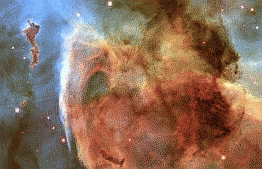 I was just watching yet another the-apocalypse-is-coming movie and had to force myself to stay to the end. I invested a lot of time in it, you see, so, you know, when you do that you feel obligated, like you don't want to short-change yourself. You deserve to see how this stupid thing ends. But it's not pretty. Like digging a two-foot deep hole and you're only a couple inches from the bottom. What the hell -- keep digging.
I was just watching yet another the-apocalypse-is-coming movie and had to force myself to stay to the end. I invested a lot of time in it, you see, so, you know, when you do that you feel obligated, like you don't want to short-change yourself. You deserve to see how this stupid thing ends. But it's not pretty. Like digging a two-foot deep hole and you're only a couple inches from the bottom. What the hell -- keep digging.Anyway, what I wanted to talk about before geting sidetracked into holes is the incredible arrogance and conceit of human beings. Earth is one medium-sized planet in a vast sea of stars that make up our Milky Way, one galaxy amongst countless hundreds of billions as far as we can see -- the horizon. And beyond that, who knows how far space and time extend. Yet, humans actually believe that God gives a shit about a bunch of barely-out-of-the-trees talking monkeys. Personally, I don't believe in a God or gods. I used to. I was raised a Catholic, went to church and confessions and the whole shebang. I believed completely when a boy. When I was troubled I'd go to church to say a rosary. But so much has happened since then, if God does exist, his distinct lack of compassion and indifference towards human suffering make it impossible for me to accept him as anything other than an unfeeling tyrant. I'm of two minds: Either there is no God and the whole thing is a hoax designed to intimidate children into obeying authority and their parents, or, he does exist and not only doesn't care but is a cruel bastard who I refuse to knuckle-down to. So the apocalypse-is-coming movies are kind of a joke. The Four Horsemen -- Conquest, War, Famine, and Death -- have been with us since the beginning of time, our time. And that's the other thing about these stories. If there is a God, what kind of a game is he playing by allowing his pet humans to be terrified by some final apocalypse bullshit when, as God, he could simply put a stop to it? It's sadistic. God-as-bully -- for the greater good. Maybe that's the deal, ultimately: We stand up to the bully -- the biggest bully in the whole damn universe -- and whammo -- we transit to a new phase of consciousness, we take responsibility for our own actions -- good or bad -- instead of crediting or blaming this illusory God -- God's will. Given the caveat -- all things being equal -- We are morally responsible for our actions. The whole Apocalypse prophecy from the Book of Revelation would possibly be worthwhile if it was designed to terrorize people into submitting to God's rule. But it isn't. When the Apocalypse strikes and begins -- it's too late. It's over. And,..., the Four Horsemen are just precursors of the much more terrible Final Judgement. And there's nothing we can do about it. Terror for its own sake and for no reason. What kind of a Master Plan is that?
*********************** “War is a ritual, a deadly ritual, not the result of aggressive self-assertion, but of self-transcending identification. Without loyalty to tribe, church, flag or ideal, there would be no wars.”
*********************** Some Enchanted Evening... "Everything is similar to nothing," he said, matter of factly. He had a buzz going and always waxed philosophically when in that condition. We waited; he merely stroked his short beard and gazed at the ceiling. He had a way of speaking that blocked a listener from seeing beneath the surface. You had no time to examine the thought behind the terms and expressions. You watched him, his eyes especially, but also his movements, so,..., friendly. It was easy to get caught up in his relaxed, almost sensual, delivery; his deftness of passion, his lightness of touch drew one as to the curve of a woman's thigh. Everything is similar to nothing held no real meaning, we all knew that, but it thrilled us nonetheless, like cool water running down our bodies on a hot summer day.
"Everything is similar to nothing," he said, matter of factly. He had a buzz going and always waxed philosophically when in that condition. We waited; he merely stroked his short beard and gazed at the ceiling. He had a way of speaking that blocked a listener from seeing beneath the surface. You had no time to examine the thought behind the terms and expressions. You watched him, his eyes especially, but also his movements, so,..., friendly. It was easy to get caught up in his relaxed, almost sensual, delivery; his deftness of passion, his lightness of touch drew one as to the curve of a woman's thigh. Everything is similar to nothing held no real meaning, we all knew that, but it thrilled us nonetheless, like cool water running down our bodies on a hot summer day.John spoke up; he had to. "If everything is nothing, then, can it be true that emptiness is the essence of substance? A long pause ensued. At least it felt long; perhaps it was only the claustrophobia of sitting so close, fighting off the budding anxiety. We all loved this, really; this tit-for-tat game of bouncing fancy ideas off one another; ideas that could mean almost anything. There was little to no danger that anyone would be shown to not understand the deeper intentions. We assumed; it was less threatening. Finally, he said, smooth as ice, "Everything is substance and emptiness is the meaning and reality of nothing. How else could we cope? No one spoke or moved from their chairs for a very long time, during which we smoked another joint and drank wine; good red wine, I might add. The exchange proceeded along these lines in fits and starts for the next few hours until the sun began to rise over the low green hills. Actually, that was the whole point of this exercise -- to watch the sun come up, stoned and drunk, feeling brilliant and alive and full of ourselves, at one with the fount of life and consciousness. It was great; a seedy, visceral Hallmark moment. We'd made it once again. Cool.
*********************** TiradeWhen's the last time you talked to somebody who believes the Earth, all it creature inhabitants, and possibly even the entire universe are only 6,000 years old? Have you ever? If you never have, I congratulate you on your choice of friends. Because, light as I would like to make of the experience, it's a little scary. If you were imagining you could have a conversation with such a person, after finding this out, a whole host of subject materials have to get tossed. Fields like Paleontology, Archaeology, Cosmology, Astronomy, and, of course, Geology -- just to name a few -- become suddenly irrelevant, meaningless, in fact -- non-existent. Try talking about when people in various parts of the world, at different times, formed villages, communities, settlements -- societies for protection and production purposes, collectives of multi-talented and skilled builders, families established as society's basic unit, the tradition of farming and keeping domesticated animals -- way back during the Stone Age, 10,000 years ago, and you'll be met with a most irritating and despicable smirk -- an arrogant, condescending, know-it-all smile plastered on the face of a grotesquely ignorant moron who considers you a pathetic simpleton and a duped member of the faceless masses. How could there be a Stone Age 10,000 years ago when the Earth itself is only 6,000 years old? Huh?
If being such meant that a person focused on the simple things in life when it comes to morality: to how people should be treated and property respected, to consideration towards other creatures with whom we share the planet -- the basics -- it would be laudable and actually make sense. But, ironically, being a fundamentalist has nothing to do with fundamentals. To name but a few more common features: it seems to translate as being unbelievably stupid, narrow-minded, self-centered, petty, intolerant, and hostile towards all who disagree, that is to say, those unbelievers who fall outside the closed-minded tribe. And as far as that goes, it doesn't take much to be branded an infidel or blasphemer. And why are fundamentalists of all stripes so intent on imposing their way of thinking and believing onto others? Why? Why is that part of it? I really don't know. Lonely? Insecure? Paranoid? As far as I'm concerned, I don't care what other people think or believe, truly, I just don't want them trying to shove it down my throat, is all. Hatred is the cohesive force, the cement that keeps fundamentalists together, that keeps them moving in the same direction with the same agenda. All I have to do is hear the word fundamentalist in a political, social or religious context and I immediately associate to it all the worst characteristics of humanity, in addition to severely arrested emotional development. And it doesn't matter how intelligent and well educated they are. In fact, the intellectuals among them encase their egos in a thicker shell [the shadow], a layered one, having a larger pool of knowledge to draw on to support their thinking. Combined with a twisted self-righteousness and a God's will mentality, there's not much that can be done to convince them of their rigid one-sided worldview. But who are these people, really, and why does a belief in their respective interpretations of their religions channel its way through anger and contempt for non-believers? And, in extreme cases, why does it express itself through hatred and the desire to kill the infidels and blasphemers? And why don't all religions instill in their members as the topmost priority: the sanctity and value of life itself? That would seem to be so obvious as to be taken for granted. And if that were the case, it would be a sublimely different world.
*********************** Author of God Is Not Great: How Religion Poisons Everything 
What if...
*********************** Scientific American: August 2010According to an article by Lawrence Krauss entitled Faith and Foolishness, the following statistics are from a 2009 Pew Survey: 31 percent of U.S. adults believe "humans and other living things have existed in their present form since the beginning of time." As stated by Krauss: "The survey's most enlightening aspect was its categorization of responses by levels of religious activity, which suggests that the most devout are on average least willing to accept the evidence of reality." Every two years the National Science Foundation produces a report, Science and Engineering Indicators, designed to probe the public's understanding of science concepts. To wit: When presented with the statement "human beings, as we know them today, developed from earlier species of animals," just 45% of respondents indicated "true." Compared to: Japan(78), Europe(70), China(69) and South Korea(64). And only 33% of adult America accepts the Big Bang theory of the beginning of the universe. I imagine that, alternatively, they believe in the God-created-it-in-six-days version. It's so much simpler holding onto ignorance. Unless a person doesn't care about stepping on the toes of others in mixed company, you have to be careful what you say nowadays in America. I recall once, in a joking mood, mentioning something about "talking monkeys." Jesus! Some guy went off vehemently denying monkeyhood; he was genuinely angry. That's another thing I've noticed about these nutjobs: The more so-called devoutly religious they claim to be, the more intolerant, potentially violent and prone to fits of rage they are. Goes with the territory, I suppose.
*********************** 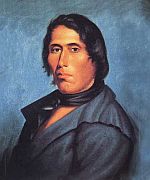 “So live your life that the fear of death can never enter your heart. Trouble no one about their religion; respect others in their view, and demand that they respect yours. Love your life, perfect your life, make beautiful all things in your life.”
“So live your life that the fear of death can never enter your heart. Trouble no one about their religion; respect others in their view, and demand that they respect yours. Love your life, perfect your life, make beautiful all things in your life.”Tecumseh, Shawnee
"Humankind has not woven the web of life. We are but one thread within it. Whatever we do to the web, we do to ourselves. All things are bound together. All things connect." Chief Seattle, Chief of the Suquamis
*********************** ObservationOne of the arguments for Intelligent Design -- a.k.a. God did it -- is based on what is perceived as the irreducibility of certain molecular and biological processes. I would like to point out that in mathematics, and elsewhere, the irreducible label is tagged onto whatever has yet to find a general enough frame of reference -- a bigger picture -- within which to be reduced; that is, factored into its fundamental constituents -- its linear individual value-centric factors. For example, a polynomial with complex roots has no solution -- is irreducible -- if confined to the Real number field. However, the invention, or discovery, of the Complex field solved this problem.
Could it be true, then, that an irreducible and emergent system, composed of a network of interrelated parts, operates on those parts from the outset, yet remains invisible to our minds? We SEE the individual parts and from that attempt to fathom an explanation as to how, evolutionary-wise, they could ever have begun independently and then come together to produce such and such a functioning arrangement. Perhaps we're putting the cart before the horse, or the horses. Let's think all together now: The parts don't end up generating the finished whole, it's the whole, invisible and behind the scene, that creates the parts in order to fulfill its destiny, in order to perform its necessary and required function.
I'll wager, however, that even they are still finding irreducibles. It's bottomless. Turtles, all the way down.
To reiterate: The basic assumption of the irreducible argument put forth by the Intelligent Designers is reductionist in the extreme. If instead, we abandon that and consider a biological system, a whole process as a unit unto itself -- interdependent parts, sub-systems, modules -- coming into being, developing and evolving as such, then any particular irreducible makes sense, in that context. Reductionist thinking is clearly one-sided and cannot hope to capture the intrinsic vitality and subtle interrelationships -- the secret links -- of living processes, let alone explain them.
From The Way Of The Cell by Franklin M. Harold: "Field: a territory that displays coordinated activity controlled by the differential distribution of some property or agent. Furthermore, since the essence of a field resides in its mathematicl description, one can examine the properties of a field without knowing anything about its physical nature. "I take the position... that a spatially extended dynamic field generated by the cell as a whole is an obligatory intermediate between gene and form. Its function is to organize gene action in space: the morphogentic field is the agency that defines the pathways of molecular transport and positioning, and ultimately localizes the forces and compliances that shape the cell. "Diagnostic features [of complexity] include the emergence in the system as a whole properties that cannot be assigned to anyone of its components, invariance of the whole even though its components fluctuate, and a complementary interplay between local causes and global ones such that each level contains the other. "They [cells] always display some kind of non-reducibility: the behavior we are interested in evaporates when we try to reduce the system to a simpler, better-understood one. "For Roses [Robert] the heart of biology is that it revolves around the pattern of connections between components. "Spontaneous self-organization then becomes a background of regularity upon which natural selection acts, and against which its effects should be measured.
"Epigenetic Landscape": The circumstances that govern and constrain the expression of genetic information, so as to channel it into a particular developmental pathway. "... form and function, physical law and historical constraints are intertwined at all levels from the molecular to the organism to the communal. "... organisms are wholes: self-maintained and persistent patterns in space and time. From this viewpoint form becomes central once again, the primary expression of an organism's identity and a point of departure for the exploration of the higher levels of biological order. "Cellular organization is the product of a hierarchy of operations. "Certain complex systems are naturally self-organizing; they generate spatial order from within, as a result of their own inherent dynamism. This holds true for living organisms too: spatial order does not emerge from the genetic program, but from the dynamics that generate morphogentic fields that, in turn, underlie morpholgy and physiology. "A pluralistic Darwinism affirms the primacy of variation and selection, but allows greater play to additional forces. Among these are historical contingency, especially episodes of extinction caused by factors external to life, and hierarchical relationships among the nested layers of life. Change and constraint can operate both upward from the level of genes and individuals, and downward from that of species and ecosystems."
NPR Interview -- Edward O. Wilson and Bert Holldobler Reflect On Insect Societies: Dr. Holldobler: "And you know, when you come to the self-organization, I just have to say, one additional word. Several organizations have worked. It doesn't explain very much. It's very good to have a term, but we like to understand which cascades of behavioral acts produce these incredible structures of these nests, for example. This is a very similar questions in how the brain is organized. We like to understand how the interactions of millions and billions of neurons lead to these structures which produces emergent ability, highly creative abilities. So, I think, here's the next frontier to understand. We, working on the social insects, ask very similar question, what neurologist, neurobiologist ask. How does the brain work? We don't know yet. How does an insect society work by self-organization? We don't know yet. But it is a true frontier to find out. It must be a cascade of signals, because it is not just random. There must be, as Ed said, a plan, but the plan is not in one individual end. The plan is this interactions of individuals, which follow a certain program we don't understand yet." Dr. Wilson: "However, on the question often this has occurred, remarkably few times in the long history of life. It's possible that the superorganism, as it is broadly defined, the ants, originated only once about 150 million years ago. And I think it's apparent that the origin of superorganisms, as Bert Holldobler has defined it for us, has occurred of only about two dozen times that we know of. It's very rare, it's a very difficult level to achieve and - but when it is achieved, as for example, in the ants or the termites, then it results in enormous success. A very small number of species come to dominate a large part of the environment. "
WIKIPEDIA: "Superorganisms: They exhibit a form of "distributed intelligence," a system in which many individual agents with limited intelligence and information are able to pool resources to accomplish a goal beyond the capabilities of the individuals."
To my mind, the basic notion in quantum mechanics is superposition. As I understand it, superposition is not only defined by a linear summation of eigenvectors -- a mixture of orthogonally distinct eigenstates inhabiting the same space -- but also can be looked at as a hierarchy of nested components, orders of embedded probabilities, somewhat like a composiition series of quotient spaces, the generic fingerprint, or signature, to be found throughout. I'm of the opinion that all major concepts are composed of these two orthogonal relationships. One spread out horizontally -- a smooth, uniform, finite, spatial extension -- and the other stacked vertically. And each vertical layer of this onion can be considered a horizontal surface. A field is a surface, its gradients -- expandable to unique surfaces all their own -- cluster here and there, and in the process effect the appearance of separable particles as well as forces, whatever they are. The vertical aspect brings with it the notion of scale invariance. Invariance (according to Felix Klein) is what specifies a geometry. And geometry is a way of reasoning about space. And you can't reason about space without introducing the concept of field. Families of patterns of invariant properties are the fundamental structures of reality. *********************** "Everything that is thought and expressed in words is one-sided, only half the truth; it all lacks totality, completeness, unity. "
"Philosophy is written in this grand book -- I mean the universe -- which stands continually open to our gaze, but it cannot be understood unless one first learns to comprehend the language and interpret the characters in which it is written. It is written in the language of mathematics, and its characters are triangles, circles and other geometric figures, without which it is humanly impossible to understand a single word of it."
"To those who do not know mathematics it is difficult to get across a real feeling as to the beauty, the deepest beauty, of nature ... If you want to learn about nature, to appreciate nature, it is necessary to understand the language that she speaks in." "There in wine is found the great generalization: all life is fermentation."
"Equations are just the boring part of mathematics. I attempt to see things in terms of geometry." "The whole history of science has been the gradual realization that events do not happen in an arbitrary manner, but that they reflect a certain underlying order, which may or may not be divinely inspired. "
"I would say that in my scientific and philosophical work, my main concern has been with understanding the nature of reality in general and of consciousness in particular as a coherent whole, which is never static or complete but which is an unending process of movement and unfoldment...." "In some sense man is a microcosm of the universe; therefore what man is, is a clue to the universe. We are enfolded in the universe."
*********************** At Last... His being dwelt beyond the confining envelope of space and time we call the universe, once a tiny seed of creator-energy. He breathed life into it and it grew, expanded, inflated into dimensions we can only imagine. He brought life and he brought death. He spread clarity and confusion, pain and joy, sadness and ecstasy. He held every infinitesimal speck of matter in his all-encompasing mind. Orchestrating the vast complex of interrelations in a dynamic dance the likes of which no mere mortal could ever begin to comprehend. He shared every thought every being across the cosmos contemplated, directing some towards himself. He was relentless in his oversight and single-minded guidance.
His being dwelt beyond the confining envelope of space and time we call the universe, once a tiny seed of creator-energy. He breathed life into it and it grew, expanded, inflated into dimensions we can only imagine. He brought life and he brought death. He spread clarity and confusion, pain and joy, sadness and ecstasy. He held every infinitesimal speck of matter in his all-encompasing mind. Orchestrating the vast complex of interrelations in a dynamic dance the likes of which no mere mortal could ever begin to comprehend. He shared every thought every being across the cosmos contemplated, directing some towards himself. He was relentless in his oversight and single-minded guidance.His name -- Bob. Bob the creator of all that is or ever will be. Humans amused him most of all. A creature torn within by hate and love, compassion and cruelty, capable of profound tenderness and generosity while yet forever striving to impose its will upon not only others of its kind but on all living things wherever they may exist. A supremely domineering, aggresive and vicious life-form. They knew not that will was his alone, that they had not the power to affect genuine change. Yet, they tried, all the more forcefully for their failures amidst great loss. Carnage deterred them not; loss of life and limb, devastation of all structure -- symbol and substance of civilization -- were seen as necessary sacrfices for the greater good, however that may be defined.
*********************** On Being Superior One of the problems, the main problem, actually, I encountered with believing myself to be superior to other human beings is the incredible amount of responsibility it entails. I mean, every discussion, for instance, I'd have to either know more than the others involved or see more clearly than they. As time went by, however, age and the rigors of life wore me down with self-doubt, loss of confidence and ordinary fear leading to blanket paranoia. So, I gave it up, the superior-to-all-other-beings thing, I mean.
One of the problems, the main problem, actually, I encountered with believing myself to be superior to other human beings is the incredible amount of responsibility it entails. I mean, every discussion, for instance, I'd have to either know more than the others involved or see more clearly than they. As time went by, however, age and the rigors of life wore me down with self-doubt, loss of confidence and ordinary fear leading to blanket paranoia. So, I gave it up, the superior-to-all-other-beings thing, I mean.You have no idea what a load off my shoulders that was. The responsibility of maintaining a superior all-knowing ego perspective is enormously strenuous, to say the least. I believed that God's will and my will were one and the same; that God, or Atman, wanted me to be self-centered and willful and to not give a damn about others; what they felt, what they thought, mattered not. Reality and morality, for them, was happening soley in their minds -- illusory and imaginary -- so, I didn't have to pay any attention to it, I could do whatever I could get away with doing. Self-acceptance leads to valuing life itself. Self-repression succeeds nothing. True freedom is not to be found in exercising every impulse regardless of how it might affect others, but rather in simply losing all that crap and identifying with life. In order to do that, however, we have to give same to others, but directly, and with understanding when it makes sense to do so. That's not just morally and ethically fair, it's how it works. It doesn't make you weaker; just the opposite. Dig this: You're driving down a country road covered by fresh snow. Suddenly, as it happens, the front of your car starts to go sideways. You turn into it, if you can, to regain control. All right, what is the optimal way to accomplish this? If you try to force yourself to act according to something you were told or read, then your chances of pulling out of it go way down. To be your natural animal self is when you have all your faculties of both body and mind working together. Trying to do otherwise diminishes your maximum potential, which is to be yourself. It's really quite obvious, but, do we listen to ourselves?
Easy to say. But what do we do with all the pain and abuse, neglect and mistreatment, far too many experience as they're growing up? Damaged goods, and in too many cases, irrevocably so. Somewhere in the middle of that mess is the real person we were meant to be. Meant to be. Ironically, sometimes things happen in our lives that actually force us to be that person. And it startles us. It might take a million years to evolve past our present condition as a species, but it begins with a single individual in the here and now assiduously working towards a goal that's already well-grounded, by going against our inclinations to be self-centered. How do we do that?
"We shall not cease from our exploration, and at the end of all our exploring, we shall arrive where we started and know the place for the first time."
"To be awake is to be alive."
"You only need sit still long enough in some attractive spot in the
woods
Henry David Thoreau
“The trick is in what one emphasizes. We either make ourselves miserable, or we make ourselves happy. The amount of work is the same.” "I am already given to the power that rules my fate. And I cling to nothing, so I will have nothing to defend. I have no thoughts, so I will see. I fear nothing, so I will remember myself. Detached and at ease, I will dart past the Eagle to be free." "The precondition for stopping the world is that one has to be convinced; in other words, one has to learn the new description in a total sense, for the purpose of pitting it against the old one, and in that way break the dogmatic certainty, which we all share, that the validity of our perceptions, or our reality of the world, is not to be questioned."
A Paleontologist on the History channel: "If you don't understand the environment of an animal, you really don't understand the animal." Same could be said, of course, for the human animal.
*********************** Plato's Cave RevisitedHe was kidnapped while in dreamland and taken far away to a sunless planet. His shadowy captors unceremoniously dumped him and left. No one else was around. He found himself lying on his back looking up at an incredibly intense starfield. No familiar band of milky white crossed his gaze. Instead, bright red stars mixed with twinkling dim yellow and blue ones stretched out evenly as far as he could see. After a time, he picked himself up and began walking. The bleak infinite blackness enclosed him with a chill damp menace that soaked his skin and mind, numbing his senses. Unable to see his hand in front of him, expecting a hole or crevice at any moment, he took careful, hesitant steps but nonetheless tripped on the broken ground and fell repeatedly, the hard gnarly surface unforgiving. After a time, his palms and forearms scraped and bloody from sliding on the gravelly sand, he grew tired. On his hands and knees, he searched for a relatively rock-free area, and lay down to rest. Why has this happened to me? he asked himself. What have I done?
*********************** Over the years I've been to an uncountable number of mathematics websites. If you're a serious math student or just someone who appreciates it and is interested in a couple of sites that employ examples to instruct, I recommend both S.O.S. Math as a premier place for math review material from algebra to differential equations, and Paul's Online Math Notes.Also, a good site dedicated specifically to Algebra is: The Purplemath Forums: Practical Algebra Lessons. And,..., just for the heck of it, because I think it's a great site with lots to offer, I put this link to Bartleby's Website. "Great Books Online" and then some. Be curious.
***********************  The Official M. C. Escher Website
The Official M. C. Escher Website
I came across this Nature Photography website by accident while looking for something else. Not the first time that's happened, huh? It's fabulous. I think you need to check it out.
The December 17, 2008 "NASA -- Imagine The Universe News" article entitled: "Dark Energy Found Stifling Growth in the Universe" has revealed that the universe taken as a whole works to maintain a balance through feedback mechanisms of the largest scale structures. Dark energy is responsible for both accelerated expansion and galaxy cluster constraint. "This result could be described as 'arrested development of the universe'," said Alexey Vikhlinin of the Smithsonian Astrophysical Observatory in Cambridge, Mass., who led the research. "Whatever is forcing the expansion of the universe to speed up is also forcing its development to slow down." Imagine a delicate ballet underlying the entire universe as though it were fundamentally necessary for life and consciousness.
******************* 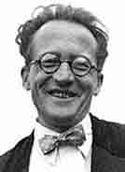 Erwin Schrodinger, the ultimate geek, believed that quantum jumps were "pure nonsense".
Erwin Schrodinger, the ultimate geek, believed that quantum jumps were "pure nonsense".
The wavefunction of a dimension is expanded into its basis of fluidly-interchanging streams [think of an ocean as being composed of rivers] by virtue of a classical measurement taking place. What causes it? Self-measurement? The crumpled-up or compacted ones are still quantum in nature -- fractionalized -- symmetry-factored to the degree of invisibility. Why can't dimensions occur in fractional pieces? Molecules. Liquid-like; blending, merging, morphing internally. Are the parts not the whole? If the whole emerges from the interplay of the parts, does it, in this act, transit phase into a higher-ordered reality? Materiality? If space itself is in a state of constant flux, forming and reforming to create the cosmos we're familiar with, then fundamentally the universe has no hard reality of its own. It is purely virtual.
How is an equivalence class of a factor group like a supersposition of basic eigenstates like a Galois group of conjugate roots of a polynomial? A common thread runs through each and somehow connects them to the idea of quantum spacetime. What is it?
which is represented by a linear transformation which is represented by a matrix composed of eigenvectors. Clear?
Alternatively, we can speak of a transformation group acting like a linear transformation on a vector space, defining, ordering and orchestrating spatial relations. Each of our three expanded dimensions can be considered a surface or manifold. Presuming they are angled in relation to one another, their respective gradients necessarily intersect, and in the act of doing so, generate the physical-sensory domain we've come to know and love. A superposition of such interpenetrating surfaces along with that of time produces the moire effect of spacetime. Is the cosmos therefore holographic in nature? A virtual universe generated by the uninterrupted interaction of multiple dimensions, only three of which we can perceive?
******************* NOTE on "writing about" Physics: According to physicist, Lee Smolin, in his book Three Roads to Quantum Gravity Quantum Mechanics retains Newton's definition of time and space while stressing the significance of the observer/observed relationship, whereas Relativity does just the opposite; that is, it overthrows Newton's time and space concepts while retaining his version of the role of the observer, which is no role at all.
According to physicist, Lee Smolin, in his book Three Roads to Quantum Gravity Quantum Mechanics retains Newton's definition of time and space while stressing the significance of the observer/observed relationship, whereas Relativity does just the opposite; that is, it overthrows Newton's time and space concepts while retaining his version of the role of the observer, which is no role at all.Far be it for lowly me to disagree with the likes of Smolin; however, the importance of the role of the observer in special relativity seems quite obvious. People (observers) in different inertial frames of reference moving at relative velocities to one another observe action happening in different ways. One might see a simultaneity of events while another, observing the same scene, reports one thing happen prior to something else. The observer's orientation affects the outcome of the measurement. Does that not point to the significance of the role of the observer? And in quantum mechanics, he states: events and processes transpire against the backdrop of Newtonian absolute time -- the never-changing river of indifferent time. But that doesn't feel right to me. After a state-vector measurement -- position, momentum, energy, whatever -- a brand new wave function must be brought on stage to be incorporated into the time-dependent Schrodinger equation as initial condition, preceding the next observation/measurement. Because of this, there's a definite discontinuity in overall proceedings -- a quantum jump. That discontinuity along the time stream does not bode well for determinism. In the frame of classical mechanics, continuity and predeterminable results are inferred and even embodied in Newton's concept of time -- perfect prediction given present state of affairs (initial conditions), quantitatively.* So, forgive me, Herr Professor Smolin, but I think you waved your hands a little too quickly there, as, I've noticed over the years, most of the science popularizers tend to do in their zest to present the focal point of their books. It doesn't mean you're a bad person,..., necessarily.
* NOTE continued...:
Here's the point: in relation to the previous NOTE, this controversy over the nature and definition of TIME can't be simply put without going into all the associated ideas any reader has going into it, and explaining or showing why any specific idea has merit and where it fits into the overall concept, or -- doesn't, and here's why it doesn't. Furthermore, when these geniuses talk to one another, they also harbor personal associations and connotations with regard to the subject at hand, ideas that need to be aired. They have to begin at square-one. Wipe everything away, knock down the Tower of Babel and take one piece at a time, show it to everybody concerned -- groups of referees, for instance -- let them agree on its meaning, and then carefully place it in the overall structure in its proper place. Build a complex from the ground up, in other words, one that's crystal clear. Because, if for no other reason, science -- in particular, physics -- is going through a revolution with regard to the meaning of fundamental concepts -- space, time, matter. Just what IS a "force" anyway? A reevaluation of assumptions is currently taking place, one that's sure to upset the apple cart. A whole new separate reality in the making. Stay tuned.
******************* Linear-time existence is built up on a continuum of discontinuous, nonlinear existences.Moment to moment, linear time is crystalized from nonlinear time, and by so doing, determinism is distilled from its fusion with unpredictability. We perceive order thereby we create linearity by defining, in the instantaneous act of perception, the manner in which we understand cause and effect. It is a wholly syntropic experience. The difficulty arises, more often than not, when we try to impose order from without according to a map or paradigm we carry in our heads. In the process of overlaying such static, nonlinearly empty, projections onto a dynamic interrelating "environment" from which we abstract ourselves, we shove the nonlinear wildness -- and simultaneously our contact with the Self -- under the carpet of a deterministic universe. We construct a prison for the Self, and try to consign Mother Nature to the role of "Thing".
******************* "But I'll tell you what hermits realize. If you go off into a far, far forest and get very quiet, you'll come to understand that you're connected with everything.""You and I are all as much continuous with the physical universe as a wave is continuous with the ocean."
"When one loses the deep, intimate relationship with nature, then temples, mosques and churches become important."
"Frequently consider the connection of all things in the universe." "We should not say ‘I am an Athenian’ or ‘I am a Roman’ but ‘I am a citizen of the Universe."
******************* Lessons To Be Learned As You Continue Your Quest
If you're looking for a place to anchor
Life is but a Card House,
Time is all we have.
Routine, Routine, Routine,
Sit in a different place today,
Drop the blinders,
OXYMORONS
I cut things of interest out of newspapers and save them. Why, I don't know. I'm not a hoarder, I'll just see something of note, like Nobel Prize winners or some famous writer's brief biography or a new finding in genetics or paleontology -- stuff. Well, the other day I was looking for something in particular when a few yellowed pieces of newspaper came tumbling onto the floor. One I want to share with you. It was the mentioning of a book entitled: "Haiku U: From Aristotle to Zola, 100 Great Books in 17 Syllables" by David Bader (Gotham Books, 112 pages). Three were included to whet the appetite, I suppose. Here they are:
******************* AsylumHe threw his belt upon the floor; immediately it turned into a snake and slithered away to hide in a corner. He ran outside to be with others, believing the fear he felt would be relieved. But everyone glowered at him, hatred and malice in their eyes. He ran farther on, past the outskirts of the city, panting, sweat dripping from his every pore, blurring his vision.
Concerned at and yet intrigued by the dank heavy smell emanating therefrom, he warily crept closer. The shade darkened to an oily sheen revealing a deeply indented cave the rear of which could not be seen. Within a few feet of this blackness, he heard a soft murmur, a sweet cry of pleasure coming from the void. He couldn't help himself. In his desperation, he approached, daring what dwelt therein to do its worst. Suddenly, a hand reached out from the dark. Steeling himself, he remained steadfast as though expecting such. A not-unpleasant-looking hand, it expressed a gentleness of form and feeling, unmenacing. Its index finger curled and beckoned, unhurriedly, sure of itself. Without hesitation -- knowing with a certainty he seldom felt -- he went forth into the darkness at the center of the three boulders resting in the canopy-covered meadow. And was never seen or heard of again.
******************* I'm retired, a retired commercial fisherman. I have little ambition or motivation left. I had one last dream, but a couple of years ago that got dashed and now, nothing. So, I don't know, but, I feel strangely unhurried in every possible way. When a sense of urgency comes over me like it used to in the old days, I immediately check it. What's the rush? I'll ask myself. What's the rush?
When the worst thing that can possibly happen in your life -- as far as you're concerned -- happens, and it's entirely your fault, what do you do? It travels with you everywhere. How do you get out of your own head? What can you do to like yourself again? How can you relieve the constant pain and remorse? How do you control the anger you feel? I don't know. I only know that it changes you and everything you do afterwards. For the good as well as the bad.
******************* An Aside: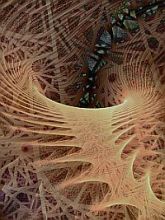 The physicist, Carlo Rovelli: "The problem of describing the quantum regime of the gravitational field is still open. Presently, there are a number of contenders: string theory, loop quantum gravity, Euclidean quantum gravity, causal dynamical triangulations, noncommutative geometry, causal sets, twistor theory, and doubly-special relativity."
The physicist, Carlo Rovelli: "The problem of describing the quantum regime of the gravitational field is still open. Presently, there are a number of contenders: string theory, loop quantum gravity, Euclidean quantum gravity, causal dynamical triangulations, noncommutative geometry, causal sets, twistor theory, and doubly-special relativity."And elsewhere: "Unlike string theory, loop quantum gravity has a direct fundamental formulation, in which the degrees of freedom are clear, and which does not rely on a background spacetime. Loop quantum gravity is thus a genuine attempt to grasp what quantum spacetime is at the fundamental level. Accordingly, the notion of spacetime that emerges from the theory is profoundly different from the one on which conventional quantum field theory is based." Furthermore: "The aim of loop quantum gravity is to unify gravity and quantum theory, and not to achieve a complete unified theory of all interactions." Basic difference: "But there are also key differences [between string theory and LQG]: in an image, strings are one-dimensional objects moving in space, while loops are one-dimensional objects forming space."
Topological Definition of a Loop
Let I=[0,1] be the unit interval and İ={0,1} the boundary of I.
f: I, İ ----> X, x0.
If f0, f1 are loops,
F: I × I, İ × I ----> X, x0 such that
In a dynamic situation, the final behaviour of a system, its shape as an end result of infinite, random combinations of simplexes, may be all that is ascertainable.
A strange attractor is understood as being generated From every vortex at once. Center as generator; shape as motion, mathematically. Center as identity. Capable of generating the entire free group. As each transformation is capable of generating the entire group, Each vortex is capable of generating the attractor; Interdependently -- When one acts, they all act, The minimum generator must therefore be a class of sub-items. Sub-items that span the field, The field acting as one, the center, the stamp.
******************* Basin of Attractor <---> Kernel of Quotient Space: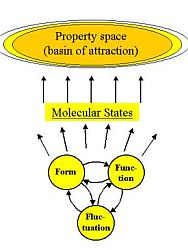 The elements of a fractal basin and the kernel of an algebraic (or topological) composition series share the equivalent idea of an underlying pattern or order defining and orienting a symmetry of interdependent relationships. A basin is so-called because solutions to the recursive equation that generates the attractor are drawn into a locus as though into a bowl, a convergent location -- what we see is the scale-invariant fractal image in motion. Similarly, the kernel represents the identity "element" of its respective factor group (quotient space), and as such, stamps or fingerprints the overall structure with its symmetric arrangement -- it's also what we see.
The elements of a fractal basin and the kernel of an algebraic (or topological) composition series share the equivalent idea of an underlying pattern or order defining and orienting a symmetry of interdependent relationships. A basin is so-called because solutions to the recursive equation that generates the attractor are drawn into a locus as though into a bowl, a convergent location -- what we see is the scale-invariant fractal image in motion. Similarly, the kernel represents the identity "element" of its respective factor group (quotient space), and as such, stamps or fingerprints the overall structure with its symmetric arrangement -- it's also what we see.An attractor exhibits all possible shapes at once -- the entire ensemble -- somewhat like a superposition of eigenstates of a wavefunction. Accordingly, a fractal is a snapshot of an attractor frozen in time, just as an eigenstate is a snapshot of a wavefunction [state vector] of a particle system frozen in time.
basin <---> basis <---> kernels
For a genuinely interesting and clearly written article on emergent phenomena, among other related concepts, check this out, especially if you have an interest in molecular biology. The primary author, of which there are three, is Professor Emeritus Bernard Testa
However, he said, when it comes to dealing with a nonlinear dynamic, the mathematics of Newton and Leibnitz must be satisfied with a linear approximation, unable to completely capture the nonlinearity bubbling up from an indeterminable core and oozing across the rational edges of the frame. What is needed is a 21st century approach, the mathematics of pattern, structure, arrangement; of internal and holistic symmetries; the complexity that arises through function building or product formation -- function seen as form. Boundary as linear; inner domain as nonlinear. In loop quantum gravity the boundary is called a spin network and the internal geometry a spin foam, in correspondence to the face of a simplex. It's a dimensional shift. As the network evolves in time, it generates the foam as slices of space. Spacetime is thus considered a superposition of spin foams.
*******************  Epsilon Eridani is approximately ten light years away. Four Jupiter-class planets (discovered thus far (12/12/09)) are known to circle the star. Determination of smaller planets will have to await more sophisticated observation tools. Nonetheless, I have a question concerning an assumption we make. When we talk about a year we are, of course, referring to the all-familiar Earth year. That is to say -- one trip around the sun (Sol).
Epsilon Eridani is approximately ten light years away. Four Jupiter-class planets (discovered thus far (12/12/09)) are known to circle the star. Determination of smaller planets will have to await more sophisticated observation tools. Nonetheless, I have a question concerning an assumption we make. When we talk about a year we are, of course, referring to the all-familiar Earth year. That is to say -- one trip around the sun (Sol).For example, I am 60 years old so I can say I've been around the sun 60 times. Now, supposedly, one of the Eridani planets takes ten of our years to circumnavigate Eridani. So, assuming the people on that planet measure age the same way we do, then one of their years is equal to ten of ours. Therefore, Eridani is ten light years away from us, but from their point of view, we are only one (1) light year away from them. You see what I'm trying to say here, measuring cosmic distances by Earth-based years is not an absolute. A light year is not the gold standard just because it's based on one trip around Sol. The definition of year is relative. Pretty obvious, huh? But I suppose someone could say that the distance traveled by light from the Eridani point of view is ten times further than what we measure. Or maybe not. Still and all, if they age ten times more slowly than we do, space travel looks less forboding. I used to be an avid Star Trek fan. The Vulcans were considered "long-lived". And they occasionally met people who were, say, 500 years old. From our Earth-based point of view this is really old, ancient, biblical. But suppose it took ten of our years for a single planetary rotation around their sun, whoever they might have been. Then they'd only be fifty. No big deal -- to them.
*********************** When Native America Formally Greeted Invading EuropeThe scientists at the International Institute for Extra-Planetary Discovery (IIED) passed around tubes filled with strong herbs, making sure everybody's pipe remained full. They were in a celebrative mood and deservedly so. The one-millionth planet in the galaxy with sentient, intelligent life on it had just been discovered and contacted. A diplomatic mission was on its way to their average-sized planet this very minute. It would take three months to arrive at trans-quark speed. All were excited, even the administrator, a usually dour man who seldom even smiled. Life was good, bonuses would be huge, vacations would be granted to everyone involved in the actual contact. The planet they discovered was named Earth by its inhabitants.
A strange and wild breed, they believed their god had bestowed this mandate upon them, and they meant to follow it through. When the diplomatic mission representing the Association, a group composed of the highest ranking members, arrived, they would be shown all manner of courtesy and respect. It's how they worked. Smiling broadly, performing conciliatory rituals to assure one and all they were eager to belong to the IAP, convincing the mission members of their good faith and straightforward intentions, they would extoll the virtues of what they had to learn. They would then offer gifts to the mission with which to return home as proof of their sincerity. However, the gifts contained viral ingredients undetectable by any type of force-oriented equipment. These humans were smart, crafty. Within days, posssibly one week, the entire central planet of the Association would be ill with an unknown disease, incurable, devastating, terminal. Other planets who came to help would fall into the same trap; no manner of protection would suffice. Within a month of the mission's return, the heart of the Association would be eliminated or at least reduced to manageable size. The humans had but to wait, pretending to be innocent, confused, wondering, troubled. All Earth occcupants had been inoculated, so invasion would be simple, a clean-up expedition at most. Humans, the scourge of the universe.
*********************** Word To The WiseWhen confronted with someone trying to get your goat [there's more colorful ways to put that], try to remember this:
It's advice I received from a long-lost friend who used to break wild mustangs when he was a young man.
***********************
*********************** Withholding your true feelings or thoughts in the chaos of the moment is to continue living in the uncertainty of your own particular and personal wavefunction -- your state-vector. Trying to please everyone at every moment is not only absurd but also impossible and grossly frustrating. It can ruin your disposition as well as your health. It's hell. Choose to be.
Arrogance and egotism, self-centered indulgence and inconsiderateness, lack of empathy or compassion, all result from a single-minded and aggressive insistence on having one's own way. Control freaks and bullies; domineering, obnoxious personalities; just plain rude ignorant people, all imagine they've discovered their true freedom granted as their birthright. Not so. They miss the point and may never find it. But, you know, telling an insulting asshole of an employer or an overbearing intrusive landlord where the bear shits in the woods can be a very liberating and empowering experience -- to hell with the consequences. Sometimes, believe it or not, it's damn worth it. And, I've learned, oftentimes it's exactly what was needed to get your life back on track, or at least, break up the logjam. A former marine sergeant who served in Viet Nam -- a good friend of mine -- during a celebrative drinking spree -- a chance meeting -- in Kodiak, Alaska, said to me, "Sometimes you just hafta throw your shit into the wind."
*********************** On Writing I want to say something about writing. For better or worse, I like to write, all kinds of things. I wrote a novel for which I did an incredible amount of research. In the process, one of the things I got into doing was: when I heard or read a word I found "interesting," one I hardly ever used, but wasn't one that was unusual, a word I knew quite well, in fact, I would write it down in a notebook; I carry a few in my car. WORDS. One word can open a whole new avenue of thought, a previously unconsidered passage, an insight not imagined before.
I want to say something about writing. For better or worse, I like to write, all kinds of things. I wrote a novel for which I did an incredible amount of research. In the process, one of the things I got into doing was: when I heard or read a word I found "interesting," one I hardly ever used, but wasn't one that was unusual, a word I knew quite well, in fact, I would write it down in a notebook; I carry a few in my car. WORDS. One word can open a whole new avenue of thought, a previously unconsidered passage, an insight not imagined before.I heard two today, actually three but the third is a bit unusual, I mean, you wouldn't hear it in ordinary talk, at least I never do -- incontrovertible. That's how I capture words, I wait for them to come by, I keep my eyes and ears open. The two I heard today were meticulous and cringe. Now how do you work them into a sentence or a springboard for a story idea or a personality characteristic? The meticulous way he arranged his desk made Pete cringe; he was homophobic and couldn't help himself. Words, they point to stuff. WORDS: arcane, rubble, sanctimonious, shackles, lissom, rapture, abscond, copious, mnemonic, stale,...
Serendipity: Coined by the English author Horace Walpole from the Persian fairytale: The Three Princes of Serendip: "... as their highnesses traveled, they were always making discoveries, by accidents and sagacity, of things which they were not in quest of...."
*********************** you're much too precious to kill!I was reading the first chapter of The Soul Of The Night by Chet Raymo when, in the midst of his description of silence, I noticed the tiniest insect I do believe I am capable of seeing, and I was wearing my reading glasses, magnification 2.0. It crawled along the cobblestone paper near the precipitous edge, an edge that capped the face of a ragged, step-wise cliff of other pages. He walked rather quickly, I thought, considering the length of his legs -- which I could not see at all -- then abruptly stopped. Barely more conspicuous that a dot on an "I", he spontaneously (out of joy?) leapt an entire inch or more, or perhaps he flew; I couldn't tell if he had wings. Then he walked through the forest of letters, losing himself intermittently, hiding behind "Ms" and "Ps" and especially a "G" where he holed-up momentariy; resting, no doubt. I was at the end of this first chapter and wanted to stop reading, but, I couldn't very well close the book on this tiny guy. However, he was there when I turned to that page so, apparently, due to the roughness of the paper's surface, the space between the pages was sufficiently vast to afford adequate room to meander. But, nonetheless, I couldn't take the chance. I grabbed a nearby empty matchbook and, placing it immediately in front of him, waited. Confronting this high curb he briefly considered, then boldy leapt -- or possibly flew -- onto it. I put the matchbook and its weightless passenger down on the floor where he vanished from sight. It is a fact -- to me -- that I've lost my mind. But, the forces in charge of the world have made me that way. And who am I to contest the forces of the world?
*********************** 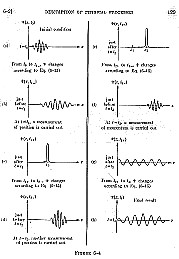 Click figure to enlarge. The Law of Causality in Quantum MechanicsEvery act of choice, every measurement, establishes a heretofore unrelated probability distribution in the form of a wavefunction that acts as the initial condition for the next act of choice. These distributions are represented by a new set of basis eigenfunctions, a new point-of-view embedded in the deterministic time-dependent Schrodinger equation -- the equation of motion for quantum mechanics. Presented with this superposition of possible outcomes for any particular property of a complementarity, we again make a choice, perform a measurement on our system effecting a sudden change in the wave equation -- a discontinuous quantum jump. And so it goes. Each unique solution of the Schrodinger at any time acts as the initial condition dictating the set of bases for the next observation/choice/measurement. They happen simultaneously: the wavefunction describing a system as the result of a measurement morphs into the initial condition, unconnected to the previous initial condition, that spells out what is next possible. That is, the unique solution of the wave equation at a specific moment determines the probability distribution of the position and momentum information of the system for some future time. We live constantly in the state-vector of coming-to-be and being. Reorientation trumps orientation, and then again, over and over. Spontaneous Space. Looking back along a trajectory line, a history, we see with these new eyes. Future eyes. Stepping across thresholds into a new world each time.
*********************** Parallel structures always intrigue me; my mind seems to be set up to notice them, either by nature or by training over many years of studying mathematics. In any event, it popped into my head (that's right; things pop like that) that an analogy can be formed between the result of a measurement morphing into the initial condition for the next measurement and the identity shift that transforms a normal subgroup into a kernel of a homomorphism.The kernel stamps a specific homomorphic image onto the parent group in much the same way that the result of a quantum measurement stamps a specific eigenvector onto the time-dependent Schrodinger wave equation. The series of homomorphic images are predetermined as possibles by the group, and the set of eigenvectors are predetermined by what's being measured. The kernel establishes the possibilities for the next factor group; the initial condition sets the range of possibilities available for the next quantum measurement. So what, you say. Well, doing this stuff keeps me out of jail!
***********************  Our heroes: Cyanobacteria. Over billions of years these tiny microorganisms terraformed the entire Earth, infusing oxygen into the oceans and atmosphere from which they removed carbon. This new atmosphere allowed for the evolution of eukaryotic microorganisms, such as protists, with whom cyano formed a symbiotic relationship, producing the ancestors of many plants (fixing and transforming atmospheric nitrogen), algae and certain fungi called lichens.
Our heroes: Cyanobacteria. Over billions of years these tiny microorganisms terraformed the entire Earth, infusing oxygen into the oceans and atmosphere from which they removed carbon. This new atmosphere allowed for the evolution of eukaryotic microorganisms, such as protists, with whom cyano formed a symbiotic relationship, producing the ancestors of many plants (fixing and transforming atmospheric nitrogen), algae and certain fungi called lichens.No other creatures have been more valuable or more versatile. I don't believe it's an exaggeration to say that, in consequence, they have proven themselves to be single-handedly (so to speak) responsible for the existence of multicellular life. Long may they live and prosper, for the good of us all.
*********************** The BridgeThe winter dawn under the heavy sky contrasted his surroundings in shades of grey, shadows and silhouettes squirmed franticaly over the ice underfoot. Towards the west the crash of invisible waves against the rocks not thirty feet away harassed his stoic calm. He kept his footing on the frozen beach road in spite of the harsh wind in his face, buffeting his knee-length, heavy, hooded overcoat, his fingers curled into a fist inside wool gloves. He was about to step onto the narrow bridge where the hill ended. The bridge passed over the stream that meandered down the canyon, now an ominous inky presence to his left, the bay immediately to his right. Off in the distance he could just barely make out the high cliffs on the other side, a darker blackness than their surroundings. As he entered the bowl of the canyon, the wind increased dramatically in pitch as well as speed, shrieking and howling across the canyon walls, chaotic and turbulent, assailing him from all directions. He was out in the open, the protection of the hill far behind, and he still had a long way to go to reach the safety of the cliffs.
*********************** In June, 2010's edition of Scientific American, there's an essay by Craig Callender, philosophy professor at the University of California, San Diego, entitled Is Time an Illusion?.Excerpts from it follow: "Time, too, [besides solidity] could be an emergent property of whatever the basic ingredients of the world are. "Instead he [Ludwig Boltzmann] proposed that the distinction between past and future is not intrinsic but arises from asymmetries in how the matter in the universe is organized. "Space and time are secondary concepts... "Spacelike-related events are causally unrelated. "A function of space plays the role of time. "So even though the system as a whole is timeless, the individual pieces are not. Hiddden in the timeless equation for the total system is a time for the subsystem. "The universe may be timeless, but if you imagine breaking it into pieces, some of the pieces can serve as clocks for the others. "Time emerges from timelessness. We perceive time because we are, by our very nature, one of those pieces. "... nonfundamental physics ... may need to be reconstructed from a network of correlations among pieces of a fundamental static world. "The tendency to believe time flows is a result of our forgetting to put ourselves and our connections to the world into the picture. "Time may exist only by breaking the world into subsystems and looking at what ties them together. In this picture, physical time emerges by virtue of our thinking ourselves as separate from everything else."
The end of separateness is the end of physical time, apparently our natural state. But the trick is, if we achieve this state of timelessness, our awareness of having done so is obliterated. We cannot be conscious of living in a time-free zone and yet maintain the illusion of separate selfhood. But, without this artifact, we can have no knowledge of time flowing in the first place and so no questioning of our basic assumptions about it. Time's end may be the final outcome of all inquiry into its validity and essential nature, but that end cannot be experienced by a conscious being. More than a koan, a genuine impossibility, to my mind. The most we can do is to happily maintain this necessary [survival, anyone?] decpetion while yet understanding that time, as a thing in itself, does not exist. That there IS something more basic [pre-spacetime] from which it emerges. But then so what? We still have to pay bills and take out the garbage. I think what's important to see amidst all the head-scratching currently going on in the physics and philosophy communities concerning the assumptions of time and space is NOT that time may or may not be an illusion, but rather that its demise is contingent on recognizing that the entire universe and all the subsystem pieces that make it up are inextricably interconnected and interdependent on multiple levels simultaneously. The cosmos has an asymmetric procliviy built in, and as a result, a predispoition to form subsystems. Without that intrinsic, pervasive feature, there would be no life. The physical principles governing and orchestrating pre-spacetime are unknown and possibly unknowable. How can we even speak of physical laws applied to conditions that both precede and underlie what we know as the material universe? Matter, time, gravity and life all come into existence simultaneously, with space granting extension to their interplay. The undifferentiated whole forms the basis of spacetime which, when differentiated into well-defined, dynamic parts, creates the universe we're familiar with. That's the fundamental reality -- nothingness. *** Word of the day: cosmography.
*********************** "For peace to reign on Earth, humans must evolve into new beings who have learned to see the whole first.""Space and time are the framework within which the mind is constrained to construct its experience of reality." "Space and time are the necessary forms of apprehension for the receptive faculty." "Time is a function of our receptive apparatus."
"Jung’s conception of personality structure consists of an aggregate of psychic entities or complexes: the persona, the shadow, the ego, the anima, the animus, with the Self forming the superordinate whole that includes all the parts, both conscious and unconscious. "The fundamental reality of the universe, according to the most ancient, and the most recent, post-modern formulations, is a continuum, a unitive field or fabric or process, of both energy and consciousness, that is beyond time, space and all forms, and yet somehow mysteriously within them; simultaneously transcendent and immanent. "In one important respect however, the sytems worldview is congruent with traditional esoteric or shamanistic traditions – and that is the notion of levels, or scales. A system's universe consists of a series of whole systems (also called holons) arranged in ordered series, in such a way that the parts of a whole at one level, become wholes at the scalar level “below” ; and are themselves parts of wholes at the scalar level “above”. "This layering of levels of complex ordering has been called by some a hierarchical principle, since the holons at the higher levels include the holons at the lower level as parts. "Systems of natural order, as found in nature, are ..... called “nested hierarchies” or “holarchies”. They are structural ordering principles of containment and interdependence. "..... beyond the layer of collective human species consciousness are forms of consciousness shared by all primates, all mammals, all animals, all life on Earth, even the cosmos." Ralph Metzner, Ph.D., author of The Unfolding Self: Varieties of Transformative Experience
"Man has no individual I. But there are, instead, hundreds and thousands of separate small "I"s, very often entirely unknown to one another, never coming into contact, or, on the contrary, hostile to each other, mutually exclusive and incompatible. "The evolution of man is the evolution of his consciousness. "With objective consciousness it is possible to see and feel the unity of everything. But for subjective consciousness the world is split up into millions of separate and unconnected phenomena.
"Faith of consciousness is freedom.
*********************** E x p a n s i o n Supposedly [as I understand it] the farthest reaches of the universe are receding away, in all directions, at an accelerated rate. Galaxies "at the edge" are primordial in appearance, crude, undeveloped. Are we therefore to conclude that our Milky Way is moving away from the border galaxies at an equally accelerated rate? Sure.
Supposedly [as I understand it] the farthest reaches of the universe are receding away, in all directions, at an accelerated rate. Galaxies "at the edge" are primordial in appearance, crude, undeveloped. Are we therefore to conclude that our Milky Way is moving away from the border galaxies at an equally accelerated rate? Sure.And, the light from there is very old, billions and billions of years old, way back to the beginning. So, of course it looks the way it does. However, there's no reason to believe that now it's any less mature than our galaxy. In fact, it's probably more mature. A resident on a planet of that distant border galaxy would see what when she looked up at the night sky? Would she see a plethora of galaxies, nebulae and stars in every direction, or only towards us, the other half being pitch black and scarily mysterious? Probably the former. And galaxies at her "horizons" would appear primordial and ancient -- the very first galaxies, the Milky Way amongst them. Okay, but what do we mean by first? If the Big Bang happened everywhere at once and then the bubble of space inflated [current story], just talking about the oldest galaxies in the universe doesn't mean anything. They just seem older because of the distance separating them from us. We're seeing them in their infantcy. Are new galaxies being formed all the time? Astronomers currently speculate that the universe evolves on all scales simultaneously. That is, the idea that first stars arise and then collect to form galaxies which further aggregate to form clusters is a bottom up view which may not be correct. Why is space spreading, increasing the distance between all matter, matter in the form of clusters of galaxies? Does this mysterious and undefinable something called space actually generate more of itself in a never-ending continuum, like taffy pulling apart or an elastic sheet forever stretching? How about this: Space, once born, continues to fracture into ever smaller versions of itself, and in this act not only creates the illusion of expanding in all directions, taking with it the billions of galaxies as passengers [space tectonics], but time too is likewise created as the illusion it is. And if that's the case, the acceleration we imagine we perceive off in the far, far distance is only this fracturing happening on an ever increasing scale of complexity [fractal-like, perhaps] in deeper and deeper dimensions of matter, ones possibly [probably] unknown to us mere humans. Particles of matter [crudely put] forming correlations and groupings about which we have no clue. Who knows?
What's the mechanism for this? Something is expanding but it's not distance between things. Maybe it's time that's expanding -- the fourth dimension -- and through this lens we see an expanding, accelerating space. Put another way, time is not on an equal footing with space, it's a function of space and as such is represented by the second differential, the rate of change of the rate of change -- acceleration. Correctly we should think: SPACEtime. Or, imagine this: Off in the distance we see one edge or one side of a cube, but as time transforms space, skewing it, the whole cube emerges, revealing itself and simultaneously rendering the impression of more space. A reorientation of perspective takes place -- somehow. Surface -- two dimensions -- changes into the three expanded that we, through the prism of our minds, are capable of sensing and of being aware. It's just a thought.
*********************** With regard to people I've known, given the choice between cognitive development and emotional maturity, I much prefer the latter. There's little worse than dealing with a person who's somewhat smart yet not smart enough to recognize his emotional childishness and tendency for petty self-centered behavior. Teenagers are notoriously narcissistic. On the flip side of that is disrepect and contempt for others. Egomaniacs who can sit and talk about themselves for hours on end should be taken out and shot. Underminers and saboteurs who are always looking to find fault, always looking for something to criticize and disapprove of, ordinarily do so out of sick twisted jealousy. Look what he has that I don't. Or, Look what he's accomplished or is able to do that I haven't or can't.They find it impossible to give credit where it's due or to feel glad for the good fortune, talent, skill, and happiness of others and are best avoided.
*********************** Self-Enlightenment?When you lose someone you love, a person who was the center of your life, who gave it meaning and importance, you don't just lose that relationship to pain and grief, you lose that life you were living, a life which defined your identity, in truth. Everything you shared with that someone -- physical surroundings, mutual friends, personal momentoes -- forms a web of familiarity that takes on a deeper significance when he or she is no longer central to it. The whole structure threatens to disassemble and fly apart, but by pure energy and an adamant refusal to abandon that life we had, we hold it in balance, integrating the many parts, like it was, almost. Unlike some of my friends, I don't believe we're here for the sole purpose of deepening our awareness of life and our selves. Learning lessons. A life of continuous self-enrichment and the pursuit of personal wisdom is way too self-centered for me. To put life events of momentous importance and transformative significance into a frame in order to find lessons to be learned on the way to enlightenment is to believe the powers that be [the Guardians?] care one way or the other about our destiny. What narcissism. The cosmos exists because I do. Rubbish. Absorbtion in self as the meaning and end-all of our lives is simply absurd and narrow-minded. When someone we love dies, we feel loss and grieve for that loss, we feel sadness. Sometimes people never get over it. In any case, what we do and have to do if we wish to move on is adapt, like a tree around a lightning bolt. But, to see a loss of heartbreaking proportions as an opportunity to learn about life and ourselves, the reason for this tragic event -- no, I don't get that. Moreover, to convince ourselves that this event happened deliberately for our ultimate benefit -- a purposeful action by the gods -- is nothing less than megalomania. And to justify it by believing the universe -- or God -- is busy at work setting up experiences for us to go through in order to raise our consciouness -- to realize Buddhahood -- is nothing short of insanity. If God has a so-called Master Plan in his vest pocket and it includes taking away the only thing in my life that makes it worth living, then screw him and his plan. I want no part of it, leave me out of that world.
*********************** In The Beginning... In the beginning, Mankind pursued a pantheistic spirituality infusing all things -- living and nonliving -- with the qualities of a Supreme Being [shamanism being the oldest form of this]. With time and learning, this model of the universe was seen as mere projection. Partially withdrawing this perception of reality into the mind whence it came, understanding evolved into a number of polytheistic mythologies and religions. Monotheistic religions came later, integrating the multiple gods and godesses and their respective sovereignties under single roofs.
In the beginning, Mankind pursued a pantheistic spirituality infusing all things -- living and nonliving -- with the qualities of a Supreme Being [shamanism being the oldest form of this]. With time and learning, this model of the universe was seen as mere projection. Partially withdrawing this perception of reality into the mind whence it came, understanding evolved into a number of polytheistic mythologies and religions. Monotheistic religions came later, integrating the multiple gods and godesses and their respective sovereignties under single roofs. Our hero, Bob Everyman, grew up in the culture of one of these types of modern religions. Everything was fine at first, but with age he began to run into some serious difficulties. His religion couldn't give him what he needed, in spite of the fervor with which he believed. It was unable to even prune let alone expunge his fears and anxieties, the scars of a dysfunctional upbringing [is there any other kind?], one hallmarked by neglect and indifference. He found the internalized beliefs to be unsatisfactory in the extreme, so he left the Church. Looking for a set of moral rules and criterion of behaviour to guide him, he turned to philosophy, studying and immersing himself in its many schools both east and west.
*********************** WESTERN MOVIES WITH THE GREATEST ENDINGS: The Wild Bunch; Unforgiven; Butch Cassidy & The Sundance Kid; Open Range; Silverado.
***********************  If the cosmos is a fluid sea, and gravity is the result of tidal effects, then black holes are whirlpools draining the sea like a pulled bathtub plug. The 4-D swiss cheese hypersurface of our universe curves round, forming the boundary of something akin to a singularity from which it sprouted. I mean, those of us who contemplate such concepts as the "Big Bang" and imagine we have some inkling as to its meaning necessarily restrict the origin of the Bang to some actual place in the cosmos. Perhaps everywhere at once will do, there not being an actual "center" to such a Bang, but nonetheless, our minds remain within the confines of this particular cosmos. But it's not logical. Assuming the universe is curved ultimately, then it must eventually fold back on itself, touch and join edge to edge, although the idea of "edge" no longer applies to what I'm saying.
If the cosmos is a fluid sea, and gravity is the result of tidal effects, then black holes are whirlpools draining the sea like a pulled bathtub plug. The 4-D swiss cheese hypersurface of our universe curves round, forming the boundary of something akin to a singularity from which it sprouted. I mean, those of us who contemplate such concepts as the "Big Bang" and imagine we have some inkling as to its meaning necessarily restrict the origin of the Bang to some actual place in the cosmos. Perhaps everywhere at once will do, there not being an actual "center" to such a Bang, but nonetheless, our minds remain within the confines of this particular cosmos. But it's not logical. Assuming the universe is curved ultimately, then it must eventually fold back on itself, touch and join edge to edge, although the idea of "edge" no longer applies to what I'm saying. The entire closed, finite universe is a hypersurface boundary of something beyond our comprehension, whence it -- and thus we -- came into being, are inextricably linked, and away from which we are forever expanding. Sounds reasonable, huh? And imagining our universe to be a flat membrane flapping around in voidspace parallel to other membranes of varying dimensions, well, think onion.
*********************** "[I] see no reason why his definition of free will— "the sustaining of a thought because I choose to when I might have other thoughts"—need be the definition of an illusion. At any rate, I will assume for the present— until next year—that it is no illusion. My first act of free will shall be to believe in free will. I will go a step further with my will, not only act with it, but believe as well; believe in my individual reality and creative power."
"Where love rules, there is no will to power, and where power predominates, love is lacking. The one is the shadow of the other."
"Words have a magical power. They can bring either the greatest happiness or deepest despair; they can transfer knowledge from teacher to student; words enable the orator to sway his audience and dictate its decisions. Words are capable of arousing the strongest emotions and prompting all men's actions." "Being entirely honest with oneself is a good exercise."
*********************** Absolute FreedomAbsolute freedom is unsustainable. I'm not referring to the power of the dictator or the divine right of royalty, they reflect assertions of will, usually backed by the threat of force, by intimidation. The freedom I'm talking about is based on a level or dimension of consciousness. Seeing directly into the essence of one's surroundings is what the Buddhists call Prajna. That space is characterized by a definite awareness of being outside the world created by the mind and unaffected by its influence. The degree to which this is true depends, of course, on the strength of our conviction. That is, physical reality is seen as an enclosing everchanging background against which the make-believe world of thoughts and images lies in relief. People, generally speaking, live their lives inside their heads, perceiving, interpreting and reacting to events according to their individual understanding, their perceptual reality. To identify exclusively with the 4-D background is to free oneself from the constraints and inhibitions of this artificially produced world of the mind. At least the option presents itself. But herein lies the problem. Absolute freedom is a drug. We can choose to ignore the rights, feelings and wishes of others; we can choose to treat others with disrepsect and contempt, and we can always put our interests first, but it's a self-destructive path that eventually wears thin. Living outside the world's hold takes a great deal of energy. Sooner or later, life will break through the wall we've wrapped around our aloneness and we'll see the truth behind our religious pursuit of absolute freedom. We'll see that in actuality we were not being the brave freedom fighters we imagined but were quite the opposite, in fact; we were afraid to stand up for our true selves and for who we loved and what we cared about. We were afraid to get involved. We were rigidly determined to be above it all, to remain superior, as we inexorably were being drawn into the undertow of everyday life. Life, for us humans, is about love and connecting and being honest. And that takes real guts.
*********************** Under The TableIn his den, Doctor Demian Dinklestein, analytical chemist, stared at the slowly rotating ceiling fan from the comfort of his favorite leather lounge chair. Surrounded by shelves laden with research materials and drafts of papers he'd written over the years, he pondered the problem he'd been working on for the past decade, considered by him to be a secret of the universe. It occupied his mind at off-hours when the real work for which he was hired by the university lost his interest, varied as it was.
His idea, to him, was simple and his inability to get it across was the source of the utmost frustration. He accused his peers and associates of being mired in the past, trapped by convention, fearfully protective of their precious reputations. It's not mysticism, he'd mutter: To each element associate a sound [note] and its spectroscopic color. To a group, link a chord and to a period, a melody. As each note is played the colors will blend and form compounds on a computer screen. Never before seen or imagined compound complexes could be discovered or created due to the degree of control over the mixing of color-sounds. Imagine a symphony of designer molecules? A Mozart of new materials with never before seen properties? Instead of only the outer shell of an atom -- its valence -- being affected, deeper shells, ones closer to the nucleus, would enter into the combinations. It was all very simple, he'd say, but he couldn't conjole any mathematically inclined chemist to work on the project. They were too busy with their own research; they would shrug, smile sympathetically, and walk away, quickly. However, serendipity rules -- sometimes. One day in the school cafeteria, Doctor Dinklestein ran into a visitor from another planet. And the rest is future history, as they say on Xulcatur.
*********************** How men read summaries of movies: "Blahdablahdablahdablahdablah, college cheerleaders, blahdablahdablahdablahdablah."Mmmmm, sounds... interesting."
What I know about the craft of writing wouldn't fill a thimble; however, based on experience I can state with confidence:
One of the secrets to writing well is re-writing
*********************** One Truth
Turned free by the lathes of hell,
*********************** Fermat's Last StandThe detective, Jake Binneli, sought answers. His partner would be on disciplinary leave for two more weeks so he'd be alone on this one. He'd recently left the crime scene, nothing more to be discovered there. The body of a young woman, a coed, was found early that morning in the school library amongst the stacks devoted to science and mathematics, the vicitm of a single gunshot to the back of the head, assasination style. The M.E. would tell him if she'd been raped. No shell casings or signs of a struggle; except for the blood spatter on the rug and some books, it was neat and clean. And no witnesses. During vacation break the library was fairly deserted. Apparently she'd been alone far in the back of the top floor, the one reserved for graduate students. Her purse hadn't been taken and money and credit cards were still in a side pocket of her suede jacket. One piece of evidence he held in his hand, an enigma no one in the precinct would be able to decipher. He'd have to ask her professors; she'd been a graduate student in the mathematics department. The piece of paper had been curled up in her hand. The note read simply: A to a prime power is congruent to A modulo that prime. What the hell? Did it have anything to do with her death or was it simply something she'd been working on at the university? He needed to find out so he arranged a meeting with her advisor, a Doctor Wilkinson.
***********************  Imagine an orange skin like the one at left. Suppose our universe were but one outlined bump on it joined at its interface with others in a countless sea of similar yet different bumps. What then would the notion of scale mean? How BIG would this megaverse be? And what would it surround?
Imagine an orange skin like the one at left. Suppose our universe were but one outlined bump on it joined at its interface with others in a countless sea of similar yet different bumps. What then would the notion of scale mean? How BIG would this megaverse be? And what would it surround?Have you ever noticed that the structural design of an orange compares favorably to that of the Earth? Maybe this morphology is the template for the megaverse. And suppose this mega-orange is only one on a tree of an orchard of uncountable trees. And further, imagine that there are zillions of orchards spread out over a single gargantuan planet in a dimensional space we can't even begin to comprehend. And that this is but a single planet of a solar system in a galaxy embedded in a universe of hundreds of billions of other galaxies. Sound familiar? Back to square one. Sometimes things get so big they get small again. Behold the orange -- the symbol of God. * In the 16th century the explorer, Ponce de Leon, introduced the navel orange to the New World, specifically, Florida.
*********************** Science Report: PaleoneurobotanyThe study of paleoneurobotany has few adherents around the world; it's a difficult subject, not meant for the faint of heart. Moreover, they are shunned by the rest of the scientific community as not only expousing what's considered fringe science, but also for not producing provable results, instead engaging in packaging pure speculation and conjecture as rock solid facts. Nonetheless, in the latest edition of the American Journal of Paleoneurobotany, no  fewer than six foremost members of that esteemed yet obscure brotherhood collaborated on a single article of ground-breaking significance. To whit: 400 million years ago, plants were on the verge of organizing neural pathways from root through stem to leaf tip into the semblance of what can only be considered a fully functioning brain capable of cognition and basic reasoning.
fewer than six foremost members of that esteemed yet obscure brotherhood collaborated on a single article of ground-breaking significance. To whit: 400 million years ago, plants were on the verge of organizing neural pathways from root through stem to leaf tip into the semblance of what can only be considered a fully functioning brain capable of cognition and basic reasoning.As it happened: Seventy-five million years after plants first gained terra firma, the self-organization of a primitive brain reached critical mass and the final threshold was about to be crossed. In fact, amongst varying species that collectively formed an ecosystem, a rudimentary language had evolved. The absence of evidence of any structure capable of functioning as vocal chords in the fossil record points to a form of telepathy as the medium of thought transfer. However, evolution hinges on contingency and necessity working in tandem. With the advent of sexuality -- flowering plants -- basic, nascent communication broke down. Consequently, as we see clearly today, they restricted themselves to spreading information through simple chemical means. It's the general consensus of paleoneurobotanists worldwide that, owing to the exploitation by flying insects (symbiotic though it be), sex curtailed and derailed the incipient emergence of genuine intelligence. It's a curious aside that such preoccupation has the same effect on humans as well.
Were it not for sex, paleoneurobotanists contend, plants may have eventually left behind their vegetative existence to achieve an organic sentience beyond mere awareness and gone on to form societies and civilizations and, possibly, become mobile in the process. Imagine an intelligent life-form able to live off the sun? What great philosophers, teachers and statesmen they would have made. God knows they could do no worse. However, they shouldn't think of themselves as failures for not realizing their ambitious dream. Maintaining the same basic body plan for 475 million years successfully is nothing to sneer at. * History of Palaeozoic Forests: The Earliest Land Plants
*********************** Do something precisely. Like, uncork a wine bottle with a fancy contraption or change out a propane tank at night in the snow or hand-sand a boat, a table, a cabinet to perfection, something. Maybe it'll become a habit. You could realize you have more control over your environment than you think. Precise. Even the word is precise.
Anointing a time When we meet a sister or brother From the past, Life was exciting, bold, intense When at the crossroads
Absolute adventure
Anointing a time
Either inside our heads only, made up by ourselves from flotsam and jetsam picked up along the road, habits of a lifetime, or externally imposed through intimidation. Beyond blatant tyrannical governments -- Nazi Germany, Myanmar, North Korea, China, Iran, Pakistan, Saudi Arabia, the STAN countries, to name a few -- we are forced -- physically, emotionally and psychologically -- into acting a certain way, a certain way that could become internalized with the right indoctrination, socialization and marketing. A way, a pattern of behaviour, a character no longer perceivable as any different from our normal self, our real self. Clutching. Unclutch. How? Get it into your head that what you're trying to hold so tightly, to protect and maintain, is not real to begin with. It's kinda like seeing patterns in the moving, morphing clouds. But, don't just abandon that persona, thereby opening yourself up the world-at-large with all its miserable humans. Own it. Just don't try to clutch it. You might as well try grabbing air. It's ethereal; not something of genuine substance. The feeling and sense of clutching and the stress and fear that go with it are created by us, ultimately. A self-induced prison and torture chamber of the mind. You're a renter -- the space is cosmic, the time your own. Stop clutching. It's the clutching that creates the illusion of separate selfhood and ego -- the painful type. * The Slang meaning of clutch is: "to spellbind; grip a person's emotions, attention, or interest, and to become tense with fright; panic."
***********************  I looked up at the night sky to see the moon racing away; I almost lost my balance. The islands of low clouds were whitish in the moonlight and though it was calm at ground level, the wind at that height must've be 30 knots.
I looked up at the night sky to see the moon racing away; I almost lost my balance. The islands of low clouds were whitish in the moonlight and though it was calm at ground level, the wind at that height must've be 30 knots. The most important things in life are irrational and intangible. I said that.
*********************** Today is Saturday, January first, 2011. The temperature is in the teens. A small cat named Sambo is curled on my lap with his head draped over my left arm, so I'm restricted to typing one-handed. I've written a lot of stuff that way. It slows you down so the sentence or phrase or word you might've typed gets transformed. Your mind has more time to consider alternatives. Writing-with-kitty-cats. You won't find that in a how-to book on writing techniques.
*********************** Giraffes EverywhereHe was raised to be a well-adjusted, even-tempered, empathetic person. His humor was most often self-effacing, and he seldom took offense even at the worst criticism. Never hesitating to compliment another for work done, he gave credit generously where it was due. On the other hand, except towards bullies and those who deserved to be taken down a peg or two, he found it unneccesary to unduly criticize and be unkind. He was beyond that petty nonsense from the very beginning. Consequently, in the frame of modern dysfunctional American society, he stood out like the proverbial pickle in a jar-full of carrots. His name was Mike, Mike O'Connell. His grandparents were from Galway, Ireland; they settled in Philadelphia along with other Irish and Germans. He loved them very much, especially his grandfather who he called Gramps. When Mike was a child they spent many a winter day together in the cellar tending the coal fire. Mike's father had left when Mike was but a baby, so his filial love was bestowed on Gramps. Mike was tall, about 6'2", with orange-red hair and blue eyes the color of a summer sky. He was smart, athletic and full of fun. He had everything going for him and yet always remained down to earth, never taking himself too seriously. In May of his 21st year, he graduated from a small private college located in North Philly. Unsure what to do with his life, whether to attend graduate school with an eye towards a career or just take some time off, he went back to work in the lumber yard where he'd spent a few summers.
It was a chilly fall afternoon, the sun shone brightly. He was walking home from work, preoccupied with thinking about a certain constellation of ideas he'd been studying of late, when a profound darkness descended. At first he thought he'd been struck blind, a stroke of some kind, so sudden was the transition. And all sound ended, no traffic noise or people talking, nothing. He could still sense the hard concrete underfoot, but that was all. Sensory deprivation. Not complete, but complete enough. He instinctively reached out, searching for anything to touch while calling for help. Momentarily, he blacked out. When he came to he was sitting on a bench on a walkway of what appeared to be a city park. The air was warm, maybe 70 degrees fahrenheit, the smell of sweet flowers wafted about. The setting was pleasant, unnaturally so. He looked around for others, but saw no one and heard nothing. The gravel and dirt walkway was riddled with strange tracks. No sooner had he noticed this minor curiosity that the sound of plodding as of hoofs disturbed the mood. He glanced off to the distance expecting to see a horse but instead a giraffe came ambling out of the trees. Wonder and amused amazement should have been his reaction to this incongruous yet harmless sight, but instead, the hairs on the back of his neck stood and his blood raced. The eyes of the giraffe, as it inexorably approached, did not appear possessed of the usual bland herbivore dullness, but rather radiated a sharp eagle-like intensity, an intensity possessed of a hint of malevolence. Overall, as the long-necked animal strode directly towards him, something sinister and alien radiated about the scene. Moreover, there showed purpose in its gait. He had no idea, of course, what it could be, but he supposed he was about to find out. Unless he ran; the thought coursed his mind, chilling his bones. But he found he couldn't even stand. So he waited as the giraffe neared. Soon, he believed, it all would become clear.
*********************** "The irony of self-realization lies in the sober recognition that its genesis is precipitated by all the profound unhappiness we've caused ourselves. A bitter fruit forcibly eaten rather than a pleasant dessert attained through wise and fortuitous choices. A flower growing amidst a wasteland of decrepitude.""May God be eternally dead and devoured by the dragons of despair." Thomas Adrian Dorn
"If you see the Buddha on the road, kill him."
*********************** He was the AntiChrist. He was spawn of Satan incarnate. He was the Source of all evil in the cosmos. So it seemed not only appropriate but also quite natural that after Law school he'd venture into politics, in particular -- the Republican Party. By pure instinct he knew where his bread was buttered, and it certainly wasn't in a soup kitchen for the homeless. His vote on anything was up for sale from the get-go and he did little to conceal that fact. After all, he'd joined the Republican Party for a reason. And whenever anyone bothered to ask what that reason was, he had a story ready to tell about an old friend who, along with his wife, had moved to a small city in Washington state. On a visit shortly afterwards, his friend had told him that, after shopping around, they had become members of the Episcopalian church.Why? he'd asked. His friend shot back the simple reply, "They have all the money." So you see, his destiny was intimately interwoven with God's Master Plan, and he embraced it wholeheartedly, some might say, salaciously. He possessed by birthright the perfect character to be a successful Republican congressman. It was in his genes.
*********************** To live for another, or others, is what makes life worthwhile and meaningful. To live exclusively for one's self is more boring than death. It doesn't make sense, but then, so little does anymore.Coincidently: I've learned from experience that not being loved by anyone is not as bad as not having anyone to love. Belonging and the sense thereof. Pretty important.
*********************** For he shall know true freedom, And probably, as well, some serious jail time.
*********************** I watched a LEARNER.ORG show on TV that had to do with writing as art, comparing the written word to its visual component, since its ancient beginnings. One Chinese artist, a brilliant man, had put english into a caligraphic frame. From a distance a page looked very much like Chinese, but close up, obviously, it was something quite unique, the english words discernable but shaped in caligraphic form.I studied Mandarin at WWU 25 years ago. I've forgotten most of it but what I do remember is the fact that the original iconographic derivations of the modern characters depict actual physical things or convey an abstraction in a straightforward manner, embellished, naturally enough, with the additional flair of scripted expression. For example, the word for middle -- zhong -- is represented by a stylized rectangle -- longer vertically -- with a straight line through its middle vertically. Zhongguo is chinese for China -- the Middle Country.
The coefficients from the underlying fixed quantum field weight the eigenvectors of the extended space. Correspondingly, any vector -- word symbolizing idea -- contained within this ideational extended vector space can be constructed by defining it in terms of a series of more basic ideas or variations on a theme, aspects as dimensions of an extended spacetime, spread out mathematically in linear-sum form, like the weighted eigenstates of a wavefunction. They, in turn, are cast, like molten gold into coins of the Realm, into a new metric [or non-metric -- a topology devoid of metric coordinates] of sense and reason, a new essential shape. That is to say, the actual word/idea is not simply spelled in a non-syntactically accepted way -- in Caligraphic form -- but that the meaning of the idea itself is altered so that its new shape comes naturally, is not forced. Therefore, if new thoughts and ideas defining time and space cannot be represented by a combinatorial series, then they cannot be quantized. And what about the gestalt perspective? The english language is written a certain way -- linearly, one letter after another, left to right -- so to morph that into one of asian characters is to alter the form but not the rationality of the english. Foreground of english, fixed background of caligraphy. Content and context. So, to reiterate, in order for gravity -- whether force or geometry -- to be quantized we have to redine space and time so that their conceptualization is perceivable as amenable to a caligraphic transformation. Now, what if we do indeed manage to free ourselves from the tyrannical convention of the english language syntactic protocol? What if written english were flexible and malleable -- moldable -- into various forms that attempted, at least, to symbolically reflect the meaning of any specific word -- a pictograph? Would then english be the background, or, moreover, would it take on an orientalness all its own?
"Since the Greeks, Western man has believed that Being, all Being, is intelligible, that there is a reason for everything ... and that the cosmos is, finally, intelligible. The Oriental, on the other hand, has accepted his existence within a universe that would appear to be meaningless, to the rational Western mind, and has lived with this meaninglessness. Hence the artistic form that seems natural to the Oriental is one that is just as formless or formal, as irrational, as life itself. "
Perhaps the scientists are trying to force western rationality onto what is at heart intrinsically irrational? I don't know; I just ask questions.
*********************** When All Else FailsHe called himself Snake. His real name was Humphrey for which he suffered as a schoolboy, but when he moved away from the neighborhood, he started to introduce himself as simply Snake. He'd reached a crossroads in his life and had decided to make a stand, to confront his demons. There lived an evil inside him he wanted to expunge, an evil so rigid and implacable as to make him feel helpless and hopeless. His first thoughts were to try to appease it, to cooperate with it in return for allowing him to know true happiness from time to time. An overseer who suppressed him on the pretense of caution, so he wouldn't get hurt. But Snake knew from experience that more pain and loss and sadness were visited on him because of this domineering illusion of protection than he would otherwise feel if allowed to act, to risk, to demonstrate faith in himself. It felt like that to him, this evil, like an alien being possessing his will; he had no control over it. He was suffocating, stifled, his spirit barely hanging on the vine, withering away.
But what bothered him more than anything was that he could see through the pretenses at the reality behind the facade. And yet he couldn't act on his own behalf, in spite of his apprehension of the true nature before him. This can't go on, he'd decided. So he worked hard to break through, to free himself. He separated into his inner self and this outer demon, a force and a being who mastered his will and denied him his birthright. The battle ensued. Sometimes he won and sometimes he lost. He accepted the situation as the best of all possible worlds and lived with it, gaining and then losing confidence along the way. But there came a time when a loss due to the dominance of the alien within was far too painful to bear, it broke his heart. He wanted to die. He knew he was at fault. And through the haze of his agony and torment, he finally saw clearly. The demon within responsible for so much unhappiness was liquidated, dethroned. It was he, after all, and not a plague upon his soul wrought by external supernatural forces as a punishment for God knows what. Henceforth, he chose to accept any and all consequences of his actions, and let the chips fall where they may. The X-factor which effectively triggered his release was the true knowledge of himself, that he was not a coward and not afraid. And what made the difference? Love. The expressive kind. The kind that makes you fearless for its sake. Love joined with that level of respect and caring that steels your integrity. Culminating in the certainty and faith that inspires a person into proclaiming simply: Enough is enough. This is who I am and how I feel. My life is important and those I love are important too, especially to me. So, back off, Jack, show respect and consideration; otherwise, drop dead. It's like, you know, pretend you're a car driving on a snowy road and suddenly you start sliding: Turn into it, man. Just -- turn into it.
*********************** The Recycled Universe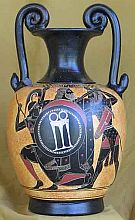 I recently discovered that battery-operated clocks tend to lose time in cold environments. It's also true that battery-operated clocks run at varying rates depending on the gravitational field within which they find themselves -- the stronger the field, the slower the tick-tock. Witness the hapless astronaut falling forever into a black hole, and closer to home, the adjustments that have to be made to our GPS satellite system in order to accommodate the change in G-force.
I recently discovered that battery-operated clocks tend to lose time in cold environments. It's also true that battery-operated clocks run at varying rates depending on the gravitational field within which they find themselves -- the stronger the field, the slower the tick-tock. Witness the hapless astronaut falling forever into a black hole, and closer to home, the adjustments that have to be made to our GPS satellite system in order to accommodate the change in G-force. So, are gravity and temperature related? Does this kind of logic drive you crazy? Would you buy tomatoes from someone who went through life thinking about such pseudo-connections? Do you think things all the way through to their practical conclusions, or do you just go off half-cocked with your first impulse, your gut? Do you believe the Earth and all its inhabitants are only 6,000 years old? Does imagining such ludicrous nonsense to be true make you feel special? Are sugar ants telepathic? Given the state of video technology and computer simulations, do you believe that because it's possible to fake events nowadays -- like the moon landings -- [Was Bruce Willis et. al. really on an asteroid? Did monstrous waves really wash over New York city?], that certain ones therefore were faked? Fuzzy reasoning -- associative logic -- if..., then..., or else. If gravity and temperature are related, then black holes are so cold that time slows down to a stop, and space -- in the physical sense as opposed to the purely mathematical one -- is squeezed so tightly that it regresses to it original phase, its nascent state, that of the undifferentiated whole. Suggestive? Plausible? Credible? Sea worthy? Thus, the hotter space is, the faster time goes by, relatively speaking, until it discontinuously transits to the dimension of timelessness. A cycle happening so quickly that beginning and end merge. Therefore, at the very beginning of creation, when the universe was a superhot speck of protoplasmic flotsam, gravity did not exist.
Mass is a property of matter equal to the measure of an object's resistance to changes in either the speed or direction of its motion. It's also a measure of the force experienced in a gravitational field (gravitational mass). The density required for matter to collapse to a black hole passes through a critical point, or threshold, transforming mass from infinite, for all practical purposes, to zero. When this happens, the nature and character of space does a flip-flop: gravity ceases to exist and motion cannot occur. Additionally, in the absence of motion or the possibility of change, mass cannot even be defined let alone measured. Therefore, at the intial germ of creation -- in the beginning -- we have zero mass, zero gravity, zero motion, and, the kicker, zero absolute temperature. The microwave background radiation is supposedly the remnant signature of the Big Bang and evidence of heat. But, where did this heat come from if motion was impossible? And if there was nothing surrounding this original seed to apply pressure? Perhaps the microwave background is the result of the so-called inflationary stage of the universe's development, and not, as presumed, the residue of a superhot beginning. We can't imagine something absolutely cold exploding. So, forget explosions; think instead -- the Big Thaw. And what would cause this thaw? Well, what's Dark Energy? Gravity needs TIME to exist, but, if time is an illusion, can gravity be other than the surface effect of motion conforming interactively to the asymmetry of space, like a wave passing through the ocean? Where did motion come from? Or, how did it emerge? What exactly is it? Without the dimension of time, there can be no motion, of course. Did motion, therefore, generate time or vice-versa?
This Janus-faced conceptual arrangement shows up in other obvious contexts. For example, it parallels Immanence and Transcendence, bound together by the same idea of merging complements. But, in order for the idea of actuality to be realizable, Immanence has to contain an asymmetric proclivity intrinsically urging growth from thesis to antithesis, eventually fusing, à là Meister Georg Hegel, on a higher plane of mutual combination. I think Aristotle alluded to this notion when he included the idea of instability as a requisite precursor condition for change to take place. We can also reference another related and interdependent twosome: Being and Becoming, with regard to Martin Buber. However, it's not exactly a seamless analogy. Moreover, Buber more precisely stated: Being IS Becoming, which, in order to make sense and have follow-through, has to be considered in the larger context of consciousness. Immanence cannot Transcend in a passive unconscious universe. Consciousness inspires otherwise dead matter to actualize its latent sense of self, its identity. The will to be and to know, farfetched and non-scientific as it sounds, may well have triggered the Big Bang. In mathematics, specifically Modern Algebra, we have extended finite fields [vector spaces] over fixed fields. The fixed field, which can be almost anything [think of it as an algebraic structure unique to itself but having isomorphic sisters], sets or stamps the geometry [invariance factors] of the identity space. The coefficients [scalars] weighting each eigenvector [basis], the linear combinations of which span the extended field as vector space, come from the fixed field. The extended space is free to define itself, yet constrained in expression by the nature of the fixed field.
Gestalt, figure-ground segregation; emergence of a whole, a singular identity, from a net of particulars; linearity from nonlinearity; limited from the unlimited; patterns in the chaos of clouds. The orthogonal gradient of the act projecting from the surface of the possible; the measured state-vector emanating from the wavefunction; a recurring and pervasive theme that invisibly backbones a fundamental and natural mode or process. Potential and actual, the acorn and the oak growing between Sun and Earth. In the beginning, there was only one position in space, which, however, did not exist in time [the notion is purely mathematical]. What caused this first motion, and hence, the generation of two positions, to occur? The eternally undead imbuing the entire living universe, over and over and over again.
*********************** God created Quantum Reality so that sentient beings -- humans, for instance -- would not be able to foretell the future with certainty. He reserved that capacity for Himself; it was His prerogative. Or, so it is believed by the faithful. Refusal to accept life's inherent uncertainty is a major stumbling block towards an understanding of our place in the cosmos. Uncertainty points to spontaneity which in turn recognizes free will as a necessity for evolution to work its magic. Destiny cannot be foretold, we can only look back along the tangled trajectory of our lives and wonder how the hell we got where we are.
***********************
*********************** Billy Bob was a bona fide sociopath. He fit the description, conformed to every criterion save two -- he wasn't promiscuous, who'd have him? And he didn't gamble -- at least not with money. Otherwise, he fit the bill to a tee. Billy Bob maintained a co-dependency relationship with Big Jim. Big Jim's problem was lack of self-esteem due to a fearful upbringing. He allowed for abuse believing that to protest would only make things worse. The end result into adulthood was little to no comprehension of personal boundaries.So, here we have it: one person who not only held zero respect for or even awareness of other peoples' boundaries, seeing others as mere things or, on a good day, as extensions of himself, but was also aggressively domineering and officious. And the other who willingly played the role of an extension. In fact, he was used to it; it was something he'd grown accustomed to. For Big Jim the consequences were grave; but not so much for Billy Bob, he was getting what he wanted. Big Jim lived in constant anxiety and insecurity, what he cared about devalued and degraded to meaninglessness, at least when Billy Bob was around. He allowed it to happen. Over and over again he'd get drawn into Billy Bob's definition of himself. They were the complete dysfunctional twosome, sharing nothing worthwhile except time.
*********************** Lately, I've been feeling like the ending to "Butch Cassidy & The Sundance Kid." It's coming soon, I know, I can feel it. No sense holding back; nothing to lose. Time's up.
Here's an idea: How 'bout if the novel Inherit The Wind were translated into Arabic and hundreds of millions of copies were dropped on Iran?
*********************** It was a sunny Saturday morning in February. I was stoned, drinking coffee and kickin' back watching a Pirates of the Caribbean movie for the umtheeth time when I suddenly got drawn into its deeper layers; now, so obvious. It's not just a fun, adventurous Disney film. It's about Freedom verses Oppression. It's about anarchy. It's about individuals searching for their true selves, wanting only to be left alone to pursue their dreams, but set upon and harassed by a world-power [England] insistant on controlling every aspect of their lives. They find themselves buffeted about by an indifferent and callous world, a world they didn't create or want, a world that needs be opposed and defied at every turn, not just for themselves, but for the sake of all freedom-loving humanity.And it's about magic, that other dimension of reality outside the dominion of what we understand as natural law, all blending seamlessly together. No wonder they drink so much rum and dress the way they do. Yeah, good weed.
Stress must go away. All stress must go away. February, middle, every day the same, some colder and wetter than others. When the sun comes out with a few white clouds sprinkled in, it's beautiful and the air is clean and clear. But it's just a tease, a cold taste of Nature's future promise, an incentive not to surrender to hopelessness and despair, to the mercy of winter's cold-hearted indifference, but rather an inspiration to keep from giving in -- so tempting -- to that long, twisting slide down the slippery slope to deep dark alcohol-soaked depression -- the Land of Murk. Cabin fever. More daylight, more, need more. Spring is on the way. Yes, that's right -- SPRING! Until then, we must do what we must.
***********************
Red-brick rowhouse,
*********************** The Will to Special StatusI was watching a movie called The One about a man who travels to one parallel universe after another killing alternative selves in order to capture their energy or soul or whatever with the end goal of concentrating their power in him and of being the only ONE of him in the multiverse -- a singular self. What nonsense. Talk about an ego. This idea of the existence of other selves making different choices and living different paths in other universes is widespread and common. I've heard people who have no scientific background whatsoever talking with glib certainty about the plurality of parallel identities as though it were a known fact. Of all the popularized scientific ideas floating around the water cooler, this one stands out as the most discussed. I think its attraction is obvious. It's satisfying to think of one's self as multidimensional, as a being capable of experiencing all possible avenues accessible from moment to moment. It allows us to imagine that the future, our future, is not set in concrete; that our destiny is not a foregone conclusion, which in itself is a positive thing. In our world, we might have to live with the negative consequences of a choice we've made, but, we somehow find comfort through this belief in alternative selves that in another universe another self has made possibly better choices. As in the movie, we imagine there's an actual physical connection with the many other versions of ourselves, as though the entire set were a single entity, an equivalence class or, in quantum-speak, a superposition of I. What is that? Are we toying with multiphrenia? Herein lies the paradox, however. Any other selves in parallel universes are going to have a history of experiences and memories quite different than ours. We're in our car at a red light, the light changes and we make a right turn. In another universe, we make a left; yet in another, we go straight. The subsequent series of actions -- our life trajectory -- will be quite different in these different universes. In a very real sense, therefore, they will each be a unique individual. The common denominator is our biological make-up, which will, nonetheless, be strongly affected in its expression by the diversity of environments these separate selves will come to know. Accordingly, that biological identity will necessarily develop and evolve along its own line. Ultimately, assuming a prehistory of individuals making choices at variance with the ones we make, our alternative versions won't be like us at all. Each of our multiple identities will veer off along paths chosen from moment to moment. And beyond the present, after so many generations, the genomes of those alternative selves will have diffused themselves throughout their respective populations through their progeny. So, in fact, from a purely logical vantage point: there will never be a time when alternative selves can simultaneously co-exist across the multiverse. Do I hear self-contradiction? There's no real reason to believe that the Many Worlds idea, constructed as a gimmick to explain the actual whereabouts of quantum possibilities after a measurement, has anything at all to do with the macro-manifestations of alternative selves acting within the confines of parallel universes. In fact, from a purely physical law point-of-view, another possible eigenstate of a quantum system existing in our universe, much less a macro-sized being, couldn't exist in an alternative cosmos unless it was an exact isomorphic duplicate [highly unlikely]. Otherwise, the natural laws regulating those other universes would preclude such precisely identical manifestations, even if they were only slightly different or lacking in some way [variation of constants, masses, and forces]. And, for the sake of argument, in the case where these alternative realities were precisely identical, as far as traveling to another bubble universe in our multiverse is concerned, we'd come up against a violation of the Laws of Matter and Energy Conservation. The same kind of misinterpretation based on Darwinism led to eugenics and the idea of the superman -- survival of the fittest. Fittest, in that misunderstood context, simply meant whoever was the biggest, strongest, toughest and most ruthless. The dominant one or people had the natural right to rule because it was nature's way, according to Darwin's principle of survival of the fittest, which he thought of as a synonym for natural selection. More nonsense. Fittest, as explained eloquently by those who actually study such things [Dawkins, Gould, Dennet], has to do with adapting to and immersing in the immediate environment -- the ecosystem -- in a cooperative way. Finding an open niche and exploiting it, not enslaving other species who have already found niches. He who is able to do that can be considered fit, not he who has managed to dominate all other species through wholesale competition and, moreover, in the case of man, has nature itself under his thumb. We have this tendency to co-opt ideas from science to justify beliefs and behaviour emanating from and restricted to our personal desires. Those who propose survival of the fittest as a perfectly decent rationale for classism, racism and genocide do so out of the conviction that they fall into the favored category. Narcissism and the will to special status have caused misery and tragedy since mankind's time began, and, as with so many things of that ilk, are wholly ironic. And as regards the Many Worlds delusion, if there are any other Adrian Dorns in some parallel universe, I really don't care. Good luck to him. It's a ridiculous untenable idea, incapable of proof and therefore having no operational meaning, not even for quantum particles. I accept the multiverse concept as probable, but not the mistaken implication that within an uncountable number of other bubbble universes, a finite subset can be found that is an exact clone and somewhere on some planet in them there exists another me. We humans with our egos are forever projecting ideas onto the mind at large that represent an anthropocentric belief. And, it is a belief only, a hope based on nothing more than the perverse notion that God has given us special status. I think that's one of the main reasons why the Many Worlds idea is so easily adopted. God didn't create just one of us, unique for all time and space, but rather millions, trillions of us scattered amongst parallel universes that go on forever. A collection of selves smeared throughout the multiverse as separate individuals, or a single self partitioned into the class of the fittest represent the same thing -- the will to special status. We simply cannot and will not accept that human beings -- human animals -- are a one time and one place experiment of nature. Our focus, therefore, should not be on increasing our sense of self-importance -- undermined somewhat by the Copernican revolution -- but instead, the emphasis should be on exploring our interconnections with the rest of life, with the planet we share, and with this one and only one universe we will ever know -- our home.
***********************
***********************
*********************** |
||||||||||||||||
***********************
*************
************* ************* |
||||||||||||||||
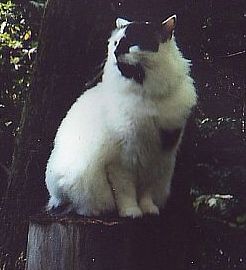

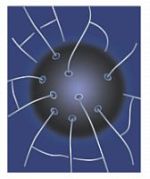 To the idea of quantum elements I associate the differential from the calculus -- the planar element. Given a well-defined coordinate system, no two planar elements can occupy the same position -- why would they want to? -- with respect to a given basis. Topologically, this mathematically infinitesimal object has no need of a frame of reference within which to claim an identity. It exists in and of itself, background independent. However, the imposition of a coordinated metric localizes it in space and time, therefore granting it not only a classic euclidean identity, but rather multiple identities, each one dependent on the choice of basis. Furthermore, combined with others of its ilk, these planar elements define a curve, and a family of these curves forms a surface equivalent to a field of singular energy/frequency.
To the idea of quantum elements I associate the differential from the calculus -- the planar element. Given a well-defined coordinate system, no two planar elements can occupy the same position -- why would they want to? -- with respect to a given basis. Topologically, this mathematically infinitesimal object has no need of a frame of reference within which to claim an identity. It exists in and of itself, background independent. However, the imposition of a coordinated metric localizes it in space and time, therefore granting it not only a classic euclidean identity, but rather multiple identities, each one dependent on the choice of basis. Furthermore, combined with others of its ilk, these planar elements define a curve, and a family of these curves forms a surface equivalent to a field of singular energy/frequency. to have it spat on and thrown back in his face. His feelings treated with open, blatant contempt; the other daring him as a bully would to stand up for himself. A game, he thought, a game for children. Finally, in the face of such perplexing refusal and disregard, he gave up and abandoned his attempts.
to have it spat on and thrown back in his face. His feelings treated with open, blatant contempt; the other daring him as a bully would to stand up for himself. A game, he thought, a game for children. Finally, in the face of such perplexing refusal and disregard, he gave up and abandoned his attempts.


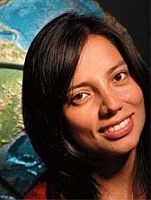


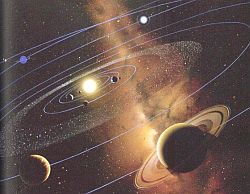 It's no news that physicists have been trying to graft Relativity to Quantum Mechanics for the past seventy or eighty years. It's not working. I don't think string theory is going anywhere if only because it has no operational meaning. Operational meaning is important in science. A theory has to be provable in the lab or outside it -- empirically -- and string theory is limited to being purely mathematical and abstract. So, what if -- and here's my idea -- there's another tier, another rung on the ladder that lies smack in the middle; interposed, intervening, between these two mutually exclusive explanations of reality? What would it look like?
It's no news that physicists have been trying to graft Relativity to Quantum Mechanics for the past seventy or eighty years. It's not working. I don't think string theory is going anywhere if only because it has no operational meaning. Operational meaning is important in science. A theory has to be provable in the lab or outside it -- empirically -- and string theory is limited to being purely mathematical and abstract. So, what if -- and here's my idea -- there's another tier, another rung on the ladder that lies smack in the middle; interposed, intervening, between these two mutually exclusive explanations of reality? What would it look like? How does a fractal [snapshot of an attractor in motion] compare to a measurement [eigenstate] of a wavefunction [state-vector] of a quantum system? The ensemble of all probable states defines the system, the property space, the wavefunction, the attractor. Does the emergent phenomenon of a dynamic attractor share significant features with a field of force, or with the symmetry and generative properties of what's called a free group? A subset of generators of a free group of transformations are responsible for its overall form, the same goes for the vortices of an attractor. And what similar processes are at work among the neurons of the brain and those of the genes when placed in the framework of a hierarchy of regulatory controls cascading down towards an ultimate effect? One more: What does the basis of a vector space have in common with any other set of building blocks?
How does a fractal [snapshot of an attractor in motion] compare to a measurement [eigenstate] of a wavefunction [state-vector] of a quantum system? The ensemble of all probable states defines the system, the property space, the wavefunction, the attractor. Does the emergent phenomenon of a dynamic attractor share significant features with a field of force, or with the symmetry and generative properties of what's called a free group? A subset of generators of a free group of transformations are responsible for its overall form, the same goes for the vortices of an attractor. And what similar processes are at work among the neurons of the brain and those of the genes when placed in the framework of a hierarchy of regulatory controls cascading down towards an ultimate effect? One more: What does the basis of a vector space have in common with any other set of building blocks? We're talkin' about America's Evangelical Christians, Fundamentalists, Conservative Republicans, followers of Nascar and World Wide Slapdown Wrestling, people who think Sarah Palin could very well be the next President of these United States, gal-dang! Rednecks! And not only here in the good ole U.S. of A. but all around the world, in different religions -- Christianity, Judaism, Islam -- you'll find fundamentalists sharing similar perspectives, differing only in the details. People who interpret their respective bibles literally; and not even the whole bible but only a few of the more eccentric parts. And on top of that, instructed by some self-appointed spokesperson-for-God telling you how to think about it. I mean, bottomline, we're talking about people incapable of thinking for themselves.
We're talkin' about America's Evangelical Christians, Fundamentalists, Conservative Republicans, followers of Nascar and World Wide Slapdown Wrestling, people who think Sarah Palin could very well be the next President of these United States, gal-dang! Rednecks! And not only here in the good ole U.S. of A. but all around the world, in different religions -- Christianity, Judaism, Islam -- you'll find fundamentalists sharing similar perspectives, differing only in the details. People who interpret their respective bibles literally; and not even the whole bible but only a few of the more eccentric parts. And on top of that, instructed by some self-appointed spokesperson-for-God telling you how to think about it. I mean, bottomline, we're talking about people incapable of thinking for themselves.
 The notion of irreducible comes up in complex systems theory when referencing emergent phenomena. The whole is not only greater than the sum of its parts, it is a thing in itself, unpredictable, engaged in a top-down feedback across scales. The morphogenetic field orchestrating the hundreds of parts of a living cell acts as a causal force prior to the fact of the cell's constituents. The cell, then, represents an emergent whole in material reflection of this field.
The notion of irreducible comes up in complex systems theory when referencing emergent phenomena. The whole is not only greater than the sum of its parts, it is a thing in itself, unpredictable, engaged in a top-down feedback across scales. The morphogenetic field orchestrating the hundreds of parts of a living cell acts as a causal force prior to the fact of the cell's constituents. The cell, then, represents an emergent whole in material reflection of this field. And in the domain of strict manifestation, the vastly complicated and intricate interconnections collaborating to form a nonlinear whole are simply too elusive to grasp. We're just not smart enough and don't know enough to see all the infinitely detailed factors involved in describing our world. Modern physics, it can be said, is really less than a hundred years old if you base it at quantum mechanics and relativity. The purists might wish to push it back 400 years to Galileo. Fine. Nonetheless, its current state of understanding and development can reasonably be regarded as barely more than surface scratches when compared to a civilization somewhere in the universe whose science is a million years old.
And in the domain of strict manifestation, the vastly complicated and intricate interconnections collaborating to form a nonlinear whole are simply too elusive to grasp. We're just not smart enough and don't know enough to see all the infinitely detailed factors involved in describing our world. Modern physics, it can be said, is really less than a hundred years old if you base it at quantum mechanics and relativity. The purists might wish to push it back 400 years to Galileo. Fine. Nonetheless, its current state of understanding and development can reasonably be regarded as barely more than surface scratches when compared to a civilization somewhere in the universe whose science is a million years old.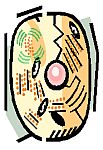 "Self-organization will also serve to underscore the distinctive features of the biological system: spatial and temporal order emerges spontaneously, in the absence of a central directing agency, in a complex molecular system kept away from equilibrium by a flux of energy.
"Self-organization will also serve to underscore the distinctive features of the biological system: spatial and temporal order emerges spontaneously, in the absence of a central directing agency, in a complex molecular system kept away from equilibrium by a flux of energy.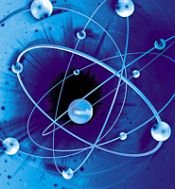 The field concept in physics is an irreducible element of physical description. There is no such thing as empty space, i.e., a space without fields. In fact, fields are space and vice-versa. What could be more fundamental, more irreducible? Whence the particles -- fermions, bosons; and the set-up -- electrons around proton/neutron pairs; virtual matter/antimatter excitations? They're the field, the whole; we look at its many parts in an artificial frame of separation. Moreover, in the real world, the immanant and the transcendent act as one, not as a complementary pair in tandem motion and not as a mechanical asymmetry of action/reaction.
The field concept in physics is an irreducible element of physical description. There is no such thing as empty space, i.e., a space without fields. In fact, fields are space and vice-versa. What could be more fundamental, more irreducible? Whence the particles -- fermions, bosons; and the set-up -- electrons around proton/neutron pairs; virtual matter/antimatter excitations? They're the field, the whole; we look at its many parts in an artificial frame of separation. Moreover, in the real world, the immanant and the transcendent act as one, not as a complementary pair in tandem motion and not as a mechanical asymmetry of action/reaction.  ---
--- 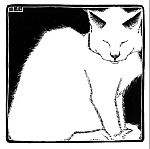 Freedom is not dependent on conditions, and it's not acting any which way we want, it resides simply in being who we are.
Freedom is not dependent on conditions, and it's not acting any which way we want, it resides simply in being who we are.  "Freedom's just another word for nothing left to lose."
"Freedom's just another word for nothing left to lose." A wavefunction is a function from a space that maps the possible states of a system into the complex numbers [a+bi], that is, a system having two generators -- space and time.
A wavefunction is a function from a space that maps the possible states of a system into the complex numbers [a+bi], that is, a system having two generators -- space and time. As far as quantum mechanics goes, I've read vague references to its time being akin to Newtonian absolute time, the time-stream flowing continuously in the background. True that conventionally quantum field theory is background dependent but, nonetheless, hold on a minute. As I said above, when I think of absolute time in the Newtonian sense, I include the ideas of predictable determinacy and uniform continuity a la classical mechanics. Given a set of initial conditions -- the experimental set-up -- position and momentum can be ascertained, exactly as predicted mathematically. Moreover, if given the same initial conditions in another time and place, the same result will obtain. But, that's not what happens in the quantum world. So, what gives?
As far as quantum mechanics goes, I've read vague references to its time being akin to Newtonian absolute time, the time-stream flowing continuously in the background. True that conventionally quantum field theory is background dependent but, nonetheless, hold on a minute. As I said above, when I think of absolute time in the Newtonian sense, I include the ideas of predictable determinacy and uniform continuity a la classical mechanics. Given a set of initial conditions -- the experimental set-up -- position and momentum can be ascertained, exactly as predicted mathematically. Moreover, if given the same initial conditions in another time and place, the same result will obtain. But, that's not what happens in the quantum world. So, what gives? "All things are woven together and the common bond is sacred, and scarcely one thing is foreign to another, for they have been arranged together in their places and together make the same ordered Universe. For there is one Universe out of all, one God through all, one substance and one law, one common Reason of all intelligent creatures and one Truth."
"All things are woven together and the common bond is sacred, and scarcely one thing is foreign to another, for they have been arranged together in their places and together make the same ordered Universe. For there is one Universe out of all, one God through all, one substance and one law, one common Reason of all intelligent creatures and one Truth." Finally spent, he came upon a quiet meadow shielded in part by willows and one giant oak. The air was warm and soft on his face, insects busied themselves flying from wild flower to flower. All sound save the rapid beating of his heart ceased as though forbidden in this hallowed place. Near the center sat three large moss-covered boulders. From where he stood, picking blackberries to assuage his thirst, he could see a glistening blue-black ribbon coursing down the rugged lumpy rock, meandering its way through the green covering like a narrow streamlet. Swinging round to gain a wider angle, a crevice of shadow opened up as though the giant rock had only then silently split for his benefit.
Finally spent, he came upon a quiet meadow shielded in part by willows and one giant oak. The air was warm and soft on his face, insects busied themselves flying from wild flower to flower. All sound save the rapid beating of his heart ceased as though forbidden in this hallowed place. Near the center sat three large moss-covered boulders. From where he stood, picking blackberries to assuage his thirst, he could see a glistening blue-black ribbon coursing down the rugged lumpy rock, meandering its way through the green covering like a narrow streamlet. Swinging round to gain a wider angle, a crevice of shadow opened up as though the giant rock had only then silently split for his benefit.  Little did this band of trusting souls know that the population of this newest prospective member to the Intergalactic Association of Planets was not from here; that is, they came from another galaxy. They came, they invaded, they killed off all whose home it was and moved in, lock, stock and barrel. That was their mission. They were infectious and insidious. Moving from galaxy to galaxy, conquering all who opposed their rule, destroying everything in their path, showing no mercy. They called themselves humans.
Little did this band of trusting souls know that the population of this newest prospective member to the Intergalactic Association of Planets was not from here; that is, they came from another galaxy. They came, they invaded, they killed off all whose home it was and moved in, lock, stock and barrel. That was their mission. They were infectious and insidious. Moving from galaxy to galaxy, conquering all who opposed their rule, destroying everything in their path, showing no mercy. They called themselves humans. Of course, that's easy to say. In the practical realm, we sometimes have to bite our tongues. We can't always tell our landlords or our bosses or even our friends and family where to shove it. The cop who stops you and then insults you, your car mechanic who's in a surly mood but has your car in pieces at the moment, the elderly lady or man; examples of the play of what's called being smart or having a sense of proportion or respect. We restrain ourselves daily in the course of our lives. Choose to be includes those times.
Of course, that's easy to say. In the practical realm, we sometimes have to bite our tongues. We can't always tell our landlords or our bosses or even our friends and family where to shove it. The cop who stops you and then insults you, your car mechanic who's in a surly mood but has your car in pieces at the moment, the elderly lady or man; examples of the play of what's called being smart or having a sense of proportion or respect. We restrain ourselves daily in the course of our lives. Choose to be includes those times. That last quote states that our sense of separateness from the world is not only the essence of a sense of self but also the cause of time flowing as well. In the act of perception, we factor wholes into correlated subsystems and thereby generate time. That is, separateness <--> self <--> time, all go together. Trying to focus on the NOW only is to attempt to use the self to enter a state of mind or consciousness that necessarily, by definition, precludes this separate selfhood. How can that be?
That last quote states that our sense of separateness from the world is not only the essence of a sense of self but also the cause of time flowing as well. In the act of perception, we factor wholes into correlated subsystems and thereby generate time. That is, separateness <--> self <--> time, all go together. Trying to focus on the NOW only is to attempt to use the self to enter a state of mind or consciousness that necessarily, by definition, precludes this separate selfhood. How can that be?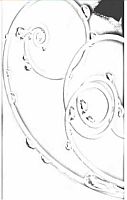 A couple of mornings ago it got winter cold, first of the season. Just outside my front door is a table and on it a bowl of rain water. That morning the surface was iced over but not smooth, lines branched out like a leaf, repeating the pattern with increasing detail, intricately refining the overall morphology. So imagine this: As space fractures into ever more complex designs, designs which repeat closely on deeper fractal layers, growing ever smaller by scale, somehow
A couple of mornings ago it got winter cold, first of the season. Just outside my front door is a table and on it a bowl of rain water. That morning the surface was iced over but not smooth, lines branched out like a leaf, repeating the pattern with increasing detail, intricately refining the overall morphology. So imagine this: As space fractures into ever more complex designs, designs which repeat closely on deeper fractal layers, growing ever smaller by scale, somehow 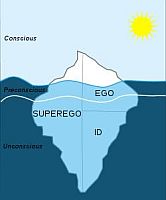
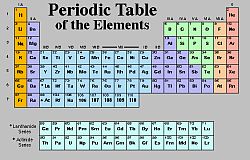 The
The  Plants are essentially opportunists, after all, especially the seed bearers who appeared after the green frontiersmen had secured terrestrial earth. The insects made it easy for these sexually active plants to reproduce and dominate the planet. Overwhelmed by clouds of pheromones in the otherwise unspoiled atmosphere, the original green spore plants -- ferns, mosses, cattails -- lost the will to evolve further along intellectual lines. They were thwarted, in other words, and regressed; instead concentrating their energies towards refinement of purely metabolic and phylogenetic design.
Plants are essentially opportunists, after all, especially the seed bearers who appeared after the green frontiersmen had secured terrestrial earth. The insects made it easy for these sexually active plants to reproduce and dominate the planet. Overwhelmed by clouds of pheromones in the otherwise unspoiled atmosphere, the original green spore plants -- ferns, mosses, cattails -- lost the will to evolve further along intellectual lines. They were thwarted, in other words, and regressed; instead concentrating their energies towards refinement of purely metabolic and phylogenetic design.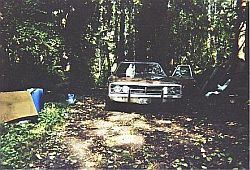 Clutching. We clutch ourselves. We hold this idea that if we maintain a certain way of doing everything, we won't screw-up. We clutch at ourselves. Insulate. Distance. Generate a persona. But the sense of clutching never goes away. This self-induced grasping stands out most definitively when we are surrounded by danger, real or imagined. Tension. Stress. Pressure. Social forces at work. And from where do these forces come? Supernatural or all too real?
Clutching. We clutch ourselves. We hold this idea that if we maintain a certain way of doing everything, we won't screw-up. We clutch at ourselves. Insulate. Distance. Generate a persona. But the sense of clutching never goes away. This self-induced grasping stands out most definitively when we are surrounded by danger, real or imagined. Tension. Stress. Pressure. Social forces at work. And from where do these forces come? Supernatural or all too real? After watching the program it came to me that mixing these two different forms of writing is conceptually what physicists are doing by attempting to shoehorn gravity into a quantum frame. There's a parallel here. Ideas are conveyed by language. Chinese-izing english corresponds to quant-izing gravity. Newton's gravity is a force, whereas Einstein's is geometry. Quantizing geometry amounts to apprehending a digital picture -- to digitize -- of an analog network of ideas, the geometric [invariant] whole being greater than the sum of its digitized parts. Gravity can only be considered a force if the energy that goes into shaping spacetime can be perceived as conforming to a set pattern; the mathematical idea of set standing in relation to pattern as point/counterpoint, inextricably melded as one.
After watching the program it came to me that mixing these two different forms of writing is conceptually what physicists are doing by attempting to shoehorn gravity into a quantum frame. There's a parallel here. Ideas are conveyed by language. Chinese-izing english corresponds to quant-izing gravity. Newton's gravity is a force, whereas Einstein's is geometry. Quantizing geometry amounts to apprehending a digital picture -- to digitize -- of an analog network of ideas, the geometric [invariant] whole being greater than the sum of its digitized parts. Gravity can only be considered a force if the energy that goes into shaping spacetime can be perceived as conforming to a set pattern; the mathematical idea of set standing in relation to pattern as point/counterpoint, inextricably melded as one.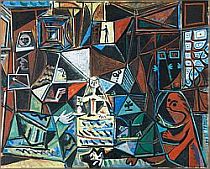 When growing up, he'd tolerated one bully after another. He remembered their names, would never forget, couldn't. He saw himself as a coward because of it. Letting himself be mistreated and humiliated, standing passively by while that which he cared about was abused, degraded and ruined. So, he loathed himself. His only wish to be completely free of the fear and anxiety he'd learned to live with while pretending to be a tough street-savvy guy. Inside, he knew it wasn't true. And this knowing made him sick at heart.
When growing up, he'd tolerated one bully after another. He remembered their names, would never forget, couldn't. He saw himself as a coward because of it. Letting himself be mistreated and humiliated, standing passively by while that which he cared about was abused, degraded and ruined. So, he loathed himself. His only wish to be completely free of the fear and anxiety he'd learned to live with while pretending to be a tough street-savvy guy. Inside, he knew it wasn't true. And this knowing made him sick at heart. Confused? How can the same natural phenomenon have opposite characteristics with respect to temperature? Spactime crushed to a point-particle size [purely hypothetical] radiating both infinite heat and infinite cold? Are we presuming too much? It's customary, as far as I know, to believe that the type of singularity proposedly residing at the center of a black hole is also that of the original cosmic seed that began it all. Our original premise was that time slows down as the temperature does. But, isn't temperature measured by motion, vibration of molecules of some physical thing? Where there is no motion, we have absolute zero temperature. And at that point, we can essentially discount gravity, because, if it exists as a force bonding things together, what is there to bond if only one thing is? So why then do we think of the primordial seed of the universe as being superhot if gravity did not exist?
Confused? How can the same natural phenomenon have opposite characteristics with respect to temperature? Spactime crushed to a point-particle size [purely hypothetical] radiating both infinite heat and infinite cold? Are we presuming too much? It's customary, as far as I know, to believe that the type of singularity proposedly residing at the center of a black hole is also that of the original cosmic seed that began it all. Our original premise was that time slows down as the temperature does. But, isn't temperature measured by motion, vibration of molecules of some physical thing? Where there is no motion, we have absolute zero temperature. And at that point, we can essentially discount gravity, because, if it exists as a force bonding things together, what is there to bond if only one thing is? So why then do we think of the primordial seed of the universe as being superhot if gravity did not exist?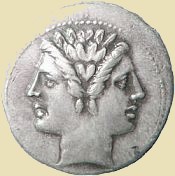 We have space, time, energy-matter, motion. Motion may have been the initial impetus for what we currently understand as the Big Bang. Without motion, there is nothing. Motion denotes change of position, a spatial concept. This is Descartes' understanding. According to Descartes, “motion . . . is nothing more than the action by which any body passes from one place to another” (Principles II, 24). On the other hand, Aristotle defines motion, by which he means change of any kind, as the actuality of a potentiality. St. Thomas Aquinas resolves the apparent contradiction between potentiality and actuality in Aristotle’s definition of motion by arguing that in every motion actuality and potentiality are mixed or blended.
We have space, time, energy-matter, motion. Motion may have been the initial impetus for what we currently understand as the Big Bang. Without motion, there is nothing. Motion denotes change of position, a spatial concept. This is Descartes' understanding. According to Descartes, “motion . . . is nothing more than the action by which any body passes from one place to another” (Principles II, 24). On the other hand, Aristotle defines motion, by which he means change of any kind, as the actuality of a potentiality. St. Thomas Aquinas resolves the apparent contradiction between potentiality and actuality in Aristotle’s definition of motion by arguing that in every motion actuality and potentiality are mixed or blended.
